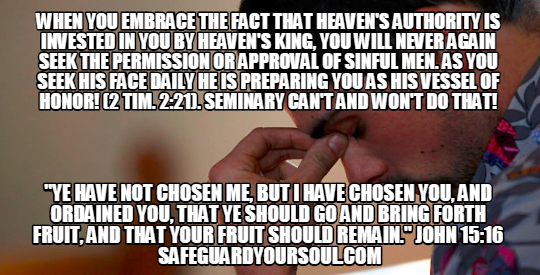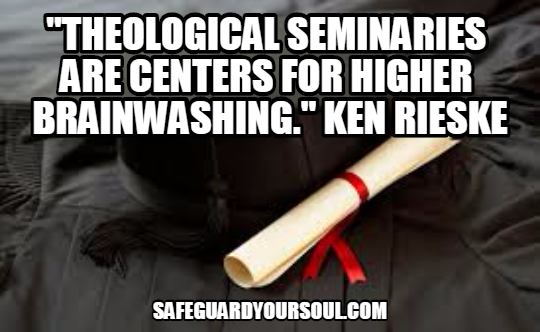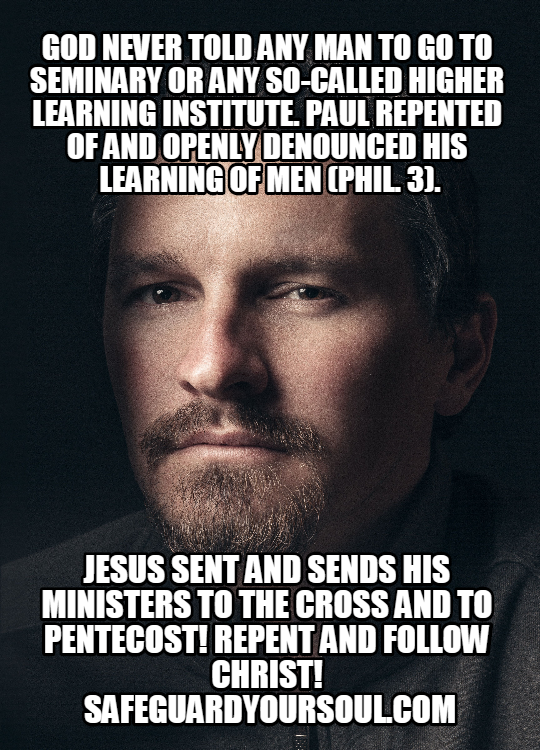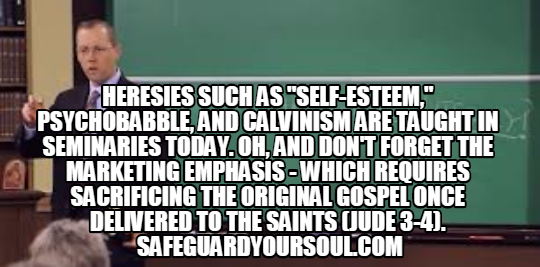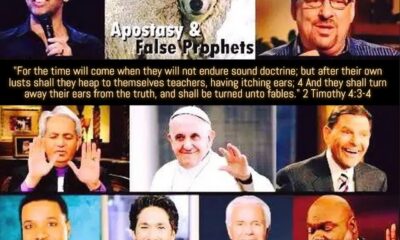Chapter four of a book by David S. Kirkwood titled The Disciple-Making Minister
Here is great question to ask ourselves: How did the early church succeed so well at making disciples without any church buildings, professionally-trained clergy, Bible schools and seminaries, hymnals and overhead projectors, wireless microphones and tape duplicators, Sunday school curriculums and youth ministries, worship teams and choirs, computers and copy machines, Christian radio and TV stations, hundreds of thousands of Christian book titles and even personally-owned Bibles? They didn’t need any of those things to make disciples, and neither did Jesus. And because none of those things were essential then, none are essential now.
When people first hear of house churches, they often mistakenly imagine that the only difference between house churches and institutional churches is their size and their relative abilities to provide “ministry.” People sometimes conclude that the house church cannot offer the quality of ministry provided by churches with buildings. But if one defines “ministry” as that which contributes to the making of disciples, helping them become like Christ and equipping them for service, then institutional churches have no advantage, and as I pointed out in the previous chapter, they may well be disadvantaged. Certainly house churches cannot provide the quantity of multi-faceted activities of institutional churches, but they can excel at providing true ministry.
Some people reject house churches as being true churches, simply because they lack an actual church building. Had those folks lived at any time during the first three hundred years of the church, they would have rejected every single church in the world as being a real church. The fact is that Jesus declared, “For where two or three have gathered together in My name, there I am in their midst” (Matt. 18:20). Jesus said nothing about where believers must gather. And even if there are only two believers, He promised to be present if they gather in His name. What Christ’s disciples often do in restaurants, sharing a meal and exchanging truth, teaching and admonishing one another, is actually closer to the New Testament model of church gatherings than what often happens in many church buildings on Sunday mornings.
In the previous chapter, I enumerated some of the advantages that house churches have over institutional churches. I’d like to begin this chapter enumerating a few more reasons why the house church model is a very valid biblical alternative that can be quite effective in accomplishing the goal of making disciples. First, however, let me state at the outset that my purpose is not to attack institutional churches or their pastors. There are multitudes of godly and sincere pastors of institutional churches who are doing everything they can within their structures to please the Lord. I minister to thousands of institutional pastors every year, and I love and appreciate them very much. They are among the finest people in the world. And it is because I know how incredibly difficult their jobs are that I want to present an alternative that will help them suffer fewer casualties and be more effective and happy at the same time. The house church model is one that is biblical and that potentially lends itself to the effective making of disciples and expansion of God’s kingdom. I have little doubt that the large majority of institutional pastors would be much happier, more effective and more fulfilled if they ministered in a house church setting.
 I was an institutional pastor for more than twenty years and did my best then with what I knew. But it was after spending several months visiting many churches on Sunday mornings that I had my first glimpse of what it is like to attend church as a mere “layperson.” It was an eye-opener, and I began to understand why so many people are so unenthusiastic about attending church. Like almost everyone except the pastor, I would sit there politely waiting for the service to be over. When it was, at least then I could interact with others as a participant rather than as a bored spectator. That experience was one of several catalysts that started me thinking about a better alternative, and I began my research on the house church model. I was amazed to discover that millions of house churches exist all over the world, and concluded that house churches have some definite advantages over institutional churches.
I was an institutional pastor for more than twenty years and did my best then with what I knew. But it was after spending several months visiting many churches on Sunday mornings that I had my first glimpse of what it is like to attend church as a mere “layperson.” It was an eye-opener, and I began to understand why so many people are so unenthusiastic about attending church. Like almost everyone except the pastor, I would sit there politely waiting for the service to be over. When it was, at least then I could interact with others as a participant rather than as a bored spectator. That experience was one of several catalysts that started me thinking about a better alternative, and I began my research on the house church model. I was amazed to discover that millions of house churches exist all over the world, and concluded that house churches have some definite advantages over institutional churches.
Most of the pastors who read this book are not overseeing house churches, but institutional churches. I know that much of what I’ve written might be initially difficult for them to swallow as it may seem so radical at first. But I ask that they give themselves some time to contemplate what I have to say, and I don’t expect them to embrace everything overnight. It is for pastors I have written, motivated by love for them and their churches.
The Only Kind of Church in the Bible
First, and foremost, institutional churches that meet in special buildings are unknown to the New Testament, whereas house churches were clearly the norm in the early church:
And when he realized this, he went to the house of Mary, the mother of John who was also called Mark, where many were gathered together and were praying (Acts 12:12; emphasis added).
…how I did not shrink from declaring to you anything that was profitable, and teaching you publicly [but not in church buildings, obviously] and from house to house…(Acts 20:20; emphasis added)
Greet Prisca and Aquila….Also greet the church that is in their house (Rom. 16:3-5; emphasis added; see also Romans 16:14-15 for mention of two other probable house churches in Rome).
The churches of Asia greet you. Aquila and Prisca greet you heartily in the Lord, with the church that is in their house (1 Cor. 16:19; emphasis added).
Greet the brethren who are in Laodicea and also Nympha and the church that is in her house (Col. 4:15; emphasis added).
And to Apphia our sister, and to Archippus our fellow soldier, and to the church in your house… (Philemon 1:2; emphasis added).
 It has been argued that the only reason the early church didn’t build church buildings is because the church was still in her infancy. But that infancy lasted through quite a few decades of recorded New Testament history (and more than two centuries after it). So if the building of church buildings is a sign of the church’s maturity, the church of the apostles of which we read in the book of Acts didn’t ever mature.
It has been argued that the only reason the early church didn’t build church buildings is because the church was still in her infancy. But that infancy lasted through quite a few decades of recorded New Testament history (and more than two centuries after it). So if the building of church buildings is a sign of the church’s maturity, the church of the apostles of which we read in the book of Acts didn’t ever mature.
I suggest that the reason none of the apostles ever built a church building is because such a thing, at bare minimum, would have been considered outside of God’s will, since Jesus left no such example or instruction. He made disciples without special buildings, and He told His disciples to make disciples. They would have not seen any need for special buildings. It is just that simple. When Jesus told His disciples to go into all the world and make disciples, His disciples did not think to themselves, “What Jesus wants us to do is to build buildings and give sermons to people there once a week.”
Additionally, building special buildings may even have been considered a direct violation of Christ’s commandment to not lay up treasures on the earth, wasting money on something that was entirely unnecessary, and robbing God’s kingdom of resources that could be used for transformational ministry.
Biblical Stewardship
This leads to the second advantage that house churches have over institutional churches: The house church model promotes godly stewardship of its members’ resources, which is certainly an extremely important aspect of discipleship. [ 1 ] No money is wasted on church buildings, owning, renting, repairing, expanding, remodeling, heating or cooling them. Consequently, what would have been wasted on buildings can be used to feed and clothe the poor, spread the gospel, and make disciples, just like it did in the book of Acts. Think of the good that could have been done for God’s kingdom if the billions of dollars spent on church buildings had been used for spreading the gospel and serving the poor! It is almost unimaginable.
Moreover, house churches that consist of no more than twenty people could actually be overseen by “tent-making” (that is, “non-paid”) elders/pastors/overseers, a real possibility when there are a number of mature believers in a house church. Such churches would require virtually no money at all to operate.
Of course, the Bible seems to indicate that elders/pastors/overseers should be paid in proportion to their labor, so those who devote their full time to ministry should make their full living from it (see 1 Tim. 5:17-18). Ten wage earners in a house church who tithe can support one pastor at their average standard of living. Five tithers in a house church can free up a pastor to devote half his workweek to his ministry.
Following the house church model, money that would be used on buildings is freed to support pastors, and so institutional pastors should not think that the proliferation of house churches threatens their job security. Rather, it could mean that many other men and women could realize the desire God has placed in their hearts to serve Him in vocational ministry. [ 2 ] That in turn, would help accomplish the goal of making disciples. Moreover, a house church with twenty wage earners could potentially give one half of its income to mission outreach and the poor. [ 3 ]
If an institutional church transitioned to a network of house churches, the people who might lose their paying jobs would be church administrative and program support staff and perhaps some staff members with specialty ministries (for example, child and youth ministers in larger churches) who would be unwilling to trade ministries that have little biblical basis for ministries that do. House churches don’t need child and youth ministers because parents are given that responsibility in the Bible, and people in house churches generally strive to follow the Bible rather than the norms of cultural Christianity. Christian youth who don’t have Christian parents can be incorporated into house churches and discipled just as they are incorporated into institutional churches. Does anyone wonder why there are no “youth pastors” or “children’s pastors” mentioned in the New Testament? Such ministries didn’t exist for the first 1900 years of Christianity. Why are they suddenly essential now, and primarily in wealthy western countries? [ 4 ]
Finally, in poorer nations in particular, pastors often find it impossible to rent or own church buildings without being subsidized by Western Christians. The undesirable consequences of this dependency are manifold. The fact is, however, that for 300 years the problem didn’t exist in Christianity. If you are pastor in a developing nation whose congregation can’t afford your own church building, you don’t need to flatter some visiting American in hopes of striking gold. God has already solved your problem. You really don’t need a church building to successfully make disciples. Follow the biblical model.
The End of Fragmented Families
Another advantage that house churches have is this: they excel at discipling children and teens. One of the great falsehoods perpetrated by institutional churches today (especially large ones in United States) is that they provide wonderful ministries to children and youth. Yet they hide the fact that the large majority of the children who experience years of fun attending their exciting children and youth ministries never return to church again upon “leaving the nest.” (Ask any youth pastor for the statistics.. he should know them.)
Additionally, churches that have youth pastors and children’s pastors continually promote the falsehood to parents that they are either incapable or not responsible for their children’s spiritual training. Again, “We’ll take care of your children’s spiritual training. We’re the trained professionals.”
The system as it stands breeds failure, because it creates a cycle of ever-increasing compromise. It begins with parents who are looking for churches that their kids enjoy. If teenager Johnny says on the ride home that he had fun in church, the parents are thrilled, because they equate Johnny’s enjoying church with Johnny’s being interesting in spiritual things. They are often dead wrong.
Success-driven senior pastors want their churches to grow, and so youth and children’s pastors often leave staff meetings feeling pressure to create “relevant” programs that kids think are fun. (“Relevant” is always secondary to “fun,” and “relevant” doesn’t necessarily mean, “Lead kids to repent, believe, and obey Jesus’ commandments.”) If the kids can be sold the program, naïve’ parents will return (with their money), and the church will grow.
The success of youth groups in particular is measured by attendance numbers. Youth pastors find themselves doing whatever it takes to pack them in, and that too often means compromising genuine spirituality. Pity the poor youth pastor who hears reports that parents are murmuring to the senior pastor that their kids are complaining about his boring or condemning messages.
But what a blessing youth pastors could be in the body of Christ if they became house church leaders. They normally already have great relational skills and possess young zeal and no lack of energy. Many of them are only youth pastors because that is the required first step for them to gradually acquire the super-human skills required to survive being senior pastors. Most are more than capable of pastoring a house church. What they’ve been doing in their youth group could well be closer to the biblical model of a church than what has been going on in the main sanctuary of the church! The same could be said of children’s pastors, who might be miles ahead of most senior pastors in being able to serve in house churches where everyone, including children, sits in one small circle, all participating and even enjoying some food together.
Children and teens are naturally better discipled in house churches, as they experience true Christian community and have opportunities to participate, ask questions, and relate to people of other ages, all as part of a Christian family. In institutional churches they are continually exposed to a big show and “fun” learning, experience very little if any true community, are often made very aware of pervasive hypocrisy, and just as in school, only learn to relate to their peers.
But in a gathering of all ages, what about babies who cry or little children who become restless?
They should always be enjoyed, and practical steps can be taken to handle them when they pose problems. They can, for example, be taken to another room to be entertained, or given crayons and paper to color on the floor. In the community of a house church, the babies and children are not problems who are dropped off at the nursery staffed by a stranger. They are loved by everyone in their extended family. A baby who starts to cry in an institutional church is often a disturbance to the formality of the service and an embarrassment to the parents who may feel the disapproving stares of strangers. A baby who starts to cry in a house church is surrounded by his family, and no one minds the reminder that a little gift from God is in their midst, a person they’ve all held in their arms.
Parents whose children are uncontrolled can be gently taught by other parents what they need to know. Again, believers have genuine, caring relationships. They aren’t gossiping about one another as is so often the case in an institutional church. They know and love each other.
Happy Pastors
Having pastored churches for two decades, having spoken to tens of thousands of pastors around the world, and having many pastors as personal friends, I think I can say that I know something about the demands of pastoring a modern church. Like every pastor of an institutional church, I have experienced the “dark side” of the ministry. It can be very dark at times. In fact, “brutal” might be a better word to describe it.
The expectations that most pastors encounter naturally create incredible stresses that sometimes even ruin their relationships within their own families. Pastors are discouraged for many reasons. They must be politicians, judges, employers, psychologists, activity directors, building contractors, marriage counselors, public speakers, managers, mind readers and administrators. They often find themselves in fierce competition with other pastors to gain a larger slice of the body of Christ. They have little time for personal spiritual disciplines. Many feel trapped in their vocation and are underpaid. Their congregations are their customers and their employers. Sometimes those employers and customers can make life very difficult.
By comparison, the house church pastor has it easy. First, if he leads an exemplary life of a true disciple and teaches uncompromised obedience to Jesus’ commandments, few goats will have an interest in being part of his group. In fact, just meeting in houses is probably enough to keep many goats away. So he’ll mostly have sheep to pastor.
Second, he can love and disciple all his sheep on a personal basis, because he only has twelve to twenty adults to oversee. He can enjoy real closeness with them, as he is like the father of a family. He can give them the time they deserve. I remember when I was an institutional pastor, I often felt alone. I couldn’t get close with anyone with my congregation, lest others resent me for not including them in my close circle of friends or become jealous of those within that circle. I longed for genuine closeness with other believers, but wouldn’t risk the potential price of gaining true friends.
In the close-knit family of a house church, the members naturally help keep the pastor accountable, as he is their close friend, not an actor on a stage.
The house church pastor can spend time developing leaders of future house churches, so when the time comes to multiply, leaders are ready. He doesn’t have to watch his most promising future leaders take their gifts from the church to a Bible school in another place.
He may well have time to develop other ministry outside his local congregation. Perhaps he could minister in prisons, personal care homes or be involved in one-on-one evangelism to refugees or businesspeople. Depending on his experience, he could conceivably devote some of his time to planting other house churches, or mentoring younger house church pastors who have been raised up under his ministry.
He feels no pressure to be a Sunday-morning performer. He never needs to prepare a three-point sermon on a Saturday night, wondering how he can possibly satisfy so many people who are at so many different levels of spiritual growth. [ 5 ] He can delight in watching the Holy Spirit use everyone at the gatherings and encourage them to use their gifts. He can be absent from meetings and everything works well even without him.
He has no building to distract him and no employees to manage.
He has no reason to compete with other local pastors.
There is no “church board” that exists to make his life miserable and through which political infighting becomes common.
In short, he can be what he is called to be by God, and not what is imposed on him by cultural Christianity. He is not the lead actor, the president of a company, or the center of the hub. He is a disciple maker, an equipper of the saints.
Happy Sheep
Everything about true, biblical house churches is what true believers desire and enjoy.
All true believers long for genuine relationships with other believers, because God’s love has been shed abroad in their hearts. Such relationships are part and parcel of house churches. It is what the Bible refers to as fellowship, genuine sharing of one’s life with other brothers and sisters. House churches create an environment where believers can do what believers are supposed to do, which is found in the many New Testament “one another” passages. In the house church setting, believers can exhort, encourage, edify, comfort, teach, serve and pray for one another. They can provoke each other to love and good works, confess their sins to each other, bear one another’s burdens, and admonish one another with psalms, hymns and spiritual songs. They can weep with those who weep and rejoice with those who rejoice. Such things don’t occur very often during the Sunday morning meetings of institutional churches where believers sit and watch. As one house church member told me, “When someone is sick within our body, I don’t take a meal to a stranger’s house because I signed up for the ‘meal ministry.’ I naturally take a meal to someone I know and love.”
True believers enjoy interaction and involvement with each other. Passively sitting and listening to irrelevant or redundant sermons year after year insults their intelligence and spirituality. Rather, they prefer having an opportunity to share the personal insights they gain concerning God and His Word, and house churches provide that opportunity. Following a biblical model rather than a cultural one, each person ”has a psalm, has a teaching, has a revelation, has a tongue, has an interpretation” (1 Cor. 14:26). In house churches, no one is lost in the crowd or excluded by a church clique.
True believers desire to be used by God in service. In a house church, there is opportunity for everyone to be used to bless others, and responsibilities are shared among all, so that no one experiences the burnout that is common among committed members of institutional churches. At the minimum, everyone can bring food to share for the common meal, what Scripture seems to refer to as the “love feast” (Jude 1:12). For many house churches, that meal follows the example of the original Lord’s Supper, which was part of an actual Passover meal. The Lord’s Supper is not, as a little boy referred to it in a previous institutional church I pastored, “God’s holy snack.” The idea of eating a small wafer and drinking a little juice among strangers during a few seconds of a church service is utterly foreign to the Bible and to biblical house churches. The sacramental meaning of Communion is enhanced manifold during a shared meal among disciples who love each other.
In a house church, worship is simple, sincere and participatory, not a performance. True believers love to worship God in spirit and truth.
Doctrinal Balance and Toleration
In the casual and open forums of small church gatherings, all teaching can be scrutinized by anyone who can read. Brothers and sisters who know and love each other are inclined to respectfully consider viewpoints that differ from theirs, and even if the group doesn’t reach a consensus, love, not doctrine, still binds them together. Any teaching by any person in the group, including elders/pastors/overseers, is subject to loving examination by anyone else, because the Teacher indwells every member (see 1 John 2:27). The built-in checks and balances of a biblical model help prevent it from becoming doctrinally derailed.
This is quite a contrast from the norm in modern institutional churches, where church doctrine is established from the start and not to be challenged. Consequently, bad doctrines endure indefinitely, and doctrine becomes the litmus test of acceptance. For this same reason, one point in a single sermon can result in the immediate exodus of dissenters, who all jump ship to temporarily find some “like-minded believers.” They know there is no sense in even talking to the pastor about their doctrinal disagreement. Even if he was persuaded to change his viewpoint, he would have to keep it hidden from many in the church as well as from those of higher rank within his denomination. Doctrinal differences within institutional churches produce pastors who are some of the most skilled politicians in the world, orators who speak in vague generalities and avoid anything that could result in controversy, leading everyone to think he is in their camp.
A Modern Trend
Interestingly, more and more institutional churches are developing small group structures within their institutional models, recognizing their value in discipleship. Some churches go even further, basing their core structure on small groups, considering them to be the most important aspect of their ministry. Larger “celebratory meetings” are secondary in importance to the small groups (at least in theory).
These are steps in the right direction, and God blesses such steps, as His blessing upon us is proportionate to the degree that we line up with His will. Indeed, “cell churches” are better structured than standard institutional churches to facilitate disciple making. They stand halfway between the institutional church model and the house church model, combining elements of both.
How do modern institutional churches with small groups compare with ancient and modern house churches? There are some differences.
For example, small groups within institutional churches unfortunately sometimes serve to promote much that is wrong within institutional churches, especially when the real motive for starting small group ministry is to build the senior pastor’s church kingdom. He consequently uses people for his own ends, and small groups fit that plan nicely. When this occurs, small group leaders are selected for their tested loyalty to the mother church, and they can’t be too gifted or charismatic, lest the devil fill their heads with ideas that they can make it on their own. This kind of policy hinders the effectiveness of small groups and, just like in any other institutional church, drives off the truly called and aspiring leaders to Bible schools and seminaries, robbing the church of true gifts, and taking such people to a place where they will be lecture-taught rather than on-the-job discipled.
Small groups in institutional churches often evolve into little more than fellowship groups. Disciple-making really doesn’t occur. Since people are supposedly being spiritually fed on Sunday mornings, small groups sometimes focus on other things besides God’s Word, not wanting a repeat of Sunday mornings.
Small groups in institutional churches are often organized by a staff member of the church, rather than birthed by the Spirit. They become one more program among many other church programs. People are put together based on ages, social status, background, interests, marital status or geographical location. Goats are often mixed with sheep. All of this fleshly organization does not help believers learn to love each other in spite of their differences. Remember that many of the early churches were a mixture of Jews and Gentiles. They regularly shared meals together, something forbidden by Jewish tradition. What a learning experience their meetings must have been! What opportunities to walk in love! What testimonies of the power of the gospel! So why do we think we must divide everyone into homogeneous groups to insure success of small groups?
Institutional churches with small groups still have the Sunday morning performance, where spectators watch the pros perform. Small groups are never permitted to meet when there are “real” church services, indicating to all that it is really the institutional services that are most important. Because of that message, many, if not the majority, of Sunday morning attendees will not get involved with a small group even if encouraged to do so, seeing them as optional. They are satisfied that they are attending the most important weekly service. So the small group concept may be promoted as being somewhat significant, but not nearly as significant as the Sunday institutional service. The best opportunity for real fellowship, discipleship and spiritual growth is effectively downplayed. The wrong message is sent. The institutional service is still king.
More Differences
Institutional churches with small groups are still structured like a corporation pyramid, where everyone knows his place in the hierarchy. The people at the top may call themselves “servant leaders,” but they often are more like chief executive officers who are responsible to make executive decisions. The larger the church, the more distant the pastor is from the members of his flock. If he is a true pastor and you can get him to admit the truth in an unguarded moment, he will usually tell you he was happier when he pastored a smaller flock.
Similarly, institutional churches with small groups still promote the clergy-laity division. Small group leaders are always in a subordinate class to the paid professionals. Bible study lessons are often passed down or approved by clergy, since small group leaders can’t be trusted with too much authority. Small groups are not permitted to practice the Lord’s Supper, or baptize. These sacred duties are reserved for the elite class with the titles and diplomas. Those who are called to vocational ministry within the body must go to a Bible school or seminary to be qualified for “real” ministry to join the elite group.
Small groups within institutional churches are sometimes nothing more than mini-church services, lasting no longer than 60 to 90 minutes, where one gifted person leads worship and another gifted person gives the approved teaching. There is little room for the Spirit to use others, distribute gifts, or develop ministers.
People are often not seriously committed to small groups in institutional churches, attending sporadically, and groups are sometimes designed to be temporary, and so the depth of community is lesser than in house churches.
Small groups in institutional churches ordinarily meet during the week so as not to crowd the weekend with another church meeting. Consequently, a midweek small group is normally time-limited to no longer than two hours for those who can attend, and prohibitive for those who have school-age children or who must travel any significant distance.
Even when institutional churches promote small group ministry, there is still a building on which to waste money. In fact, if the small group program adds people to the church, even more money ends up being wasted on building programs. Additionally, organized small groups within institutional churches often require at least one additional paid staff person. That means more money for another church program.
Perhaps worst of all, pastors of institutional churches with small groups are often extremely limited in their personal disciple making. They are so busy with their many responsibilities and find little time for one-on-one discipleship. About the closest they can get is discipling the small group leaders, but even that is often limited to a once-a-month meeting.
All of this is to say that house churches, in my opinion, are more biblical and effective in making and multiplying disciples and disciple-makers. I realize, however, that my opinion is not going to quickly change hundreds of years of church tradition. So I urge institutional pastors to dosomething in the direction of moving their churches to a more biblical model of disciple-making. [ 6 ] They could consider personally discipling future leaders or initiating small group ministry. They could hold an “early-church Sunday” when the church building would be closed and everyone would share a meal in homes and attempt to meet like Christians did for the first three centuries. Pastors who have small groups within their churches could consider releasing some of those small groups to form house churches and see what happens. If small groups are healthy and lead by God-called pastors/elders/overseers, they should be able to operate on their own. They don’t need the mother church any more than any non-affiliated young church needs that mother church. Why not set them free? [ 7 ] The member’s money that is going to the mother church could support the pastor of the house church.
Does my endorsement of house churches mean that there is nothing good to say about institutional churches? Absolutely not. To the degree that disciples who obey Christ are being made in institutional churches, they are to be commended. Their practices and structure, however, can sometimes be more of hindrance than a help to reaching the goal Christ has set before us, and they are often pastor killers.
What Happens at a House Church Gathering?
Not every house church needs to be structured the same, and there is room for a lot of variation. Every house church should reflect its own cultural and social nuances—one reason why house churches can be very effective in evangelism, especially in countries that have no Christian cultural tradition. House church members don’t invite their neighbors to a church building that appears completely foreign to them where they would be involved in rituals that are completely foreign to them—major obstacles to conversions. Rather, they invite their neighbors to a meal with their friends.
The common meal is generally a major component of a house church meeting. For many house churches, that meal includes or is the Lord’s Supper, and each individual house church can decide how to best bring out its spiritual significance. As previously mentioned, the originalLord’s Supper began as an actual Passover meal that was packed with spiritual significance by itself. Celebrating the Lord’s Supper as a meal or part of a meal is the apparent pattern followed when the early believers gathered. We read of the early Christians:
And they were continually devoting themselves to the apostles’ teaching and to fellowship, to the breaking of bread and to prayer….And day by day continuing with one mind in the temple, and breaking bread from house to house, they were taking their meals together with gladness and sincerity of heart (Acts 2:42, 46; emphasis added).
The early Christians were literally taking loaves of bread, breaking them, and sharing them together, something that was done at practically every meal in their culture. Could that breaking of bread during a meal have had some spiritual significance to the early Christians? The Bible doesn’t say for certain. However, William Barclay writes in his book, The Lord’s Supper, “It is not in doubt that the Lord’s Supper began as a family meal or a meal of friends in a private house….The idea of a tiny piece of bread and a sip of wine bears no relation at all to the Lord’s Supper as it originally was….The Lord’s Supper was originally a family meal in a household of friends.” It is amazing that every modern biblical scholar agrees with Barclay, yet the church still follows its tradition rather than God’s Word on this issue!
Jesus commanded His disciples to teach their disciples to obey all that He had commanded them, so when He commanded them to eat bread and drink wine together in remembrance of Him, they would have taught their disciples to do the same. Could that have been done at common meals? It certainly seems as if it was when we read some of Paul’s words to the Corinthians believers:
Therefore when you meet together [and he is not talking about meeting in church buildings, because there were none] it is not to eat the Lord’s Supper, for in your eating each one takes his own supper first; and one is hungry and another is drunk (1 Cor. 11:20-21; emphasis added).
How would such words make any sense if Paul was speaking about the Lord’s Supper as it is practiced in modern churches? Have you ever heard of the problem of anyone in a modern church service taking his own supper first, and one being hungry while another one is drunk in conjunction with the Lord’s Supper? Such words would only make sense if the Lord’s Supper was done in conjunction with a real meal. Paul continues:
What! Do you not have houses in which to eat and drink? Or do you despise the church of God [remember, Paul was not writing about a church building, but a gathering of people, the church of God], and shame those who have nothing? What shall I say to you? Shall I praise you? In this I will not praise you (1 Cor. 11:22).
How would people be shamed who had nothing if what was being done was not in the context of an actual meal? Paul was pointing out the fact that some of the Corinthian believers who arrived earliest at their gatherings ate their own meal without waiting for the others to arrive. When some arrived who were perhaps so poor that they brought no food to share at the common meal, they were not only left hungry, but also shamed because it was so obvious they had brought nothing.
Immediately after this, Paul wrote more about the Lord’s Supper, a sacrament that he “received from the Lord” (1 Cor. 11:23), and he recounted what happened at the first Lord’s Supper (see 1 Cor. 11:24-25). He then warned the Corinthians against partaking of the Lord’s Supper in an unworthy manner, stating that if they didn’t judge themselves, they could actually eat and drink judgment upon themselves in the form of weakness, sickness and even premature death (see 1 Cor. 11:26-32).
He then concluded,
So then, my brethren, when you come together to eat, wait for one another. If anyone is hungry, let him eat at home, so that you may not come together for judgment (1 Cor. 11:33-34).
Contextually, the offense being committed at the Lord’s Supper was inconsideration of other believers. Paul again warned that those who were eating their own supper first at what was supposed to be a shared, common meal, were in danger of being judged (or disciplined) by God. The solution was simple. If one was so hungry that he couldn’t wait for the others, he should eat something before he came to the gathering. And those who arrived earliest should wait for those who arrived later for the meal, a meal that apparently included or was the Lord’s Supper.
When we look at the entire passage, it seems clear Paul was saying that if it was the Lord’s Supper that was being eaten, it would be done in a way that it was pleasing to the Lord, reflecting love and consideration for each other.
In any case, it is crystal clear that the early church practiced the Lord’s Supper as part of a common meal in homes without an officiating clergy. Why don’t we?
Bread and Wine
The nature of the elements of the Lord’s Supper are not the most important thing. If we must strive for perfect imitation of the original Lord’s Supper, we would have to know the exact ingredients of the bread and the exact kind of grapes from which the original wine was made. (Some of the church fathers during the first few centuries strictly prescribed that the wine had to be diluted with water, otherwise the Eucharist was being practiced improperly.)
Bread and wine were some of the most common elements of the ancient Jewish meals. Jesus gave profound significance to two things that were incredibly common, foods that practically everyone consumed each day. Had He visited another culture at a different time in history, the first Lord’s Supper may have consisted of cheese and goat’s milk, or rice cakes and pineapple juice. So any food and drink could potentially represent His body and blood at a common meal shared among His disciples. The important thing is the spiritual significance. Let us not neglect the spirit of the law while succeeding at keeping the letter of it!
It is not necessary that common meals be deathly solemn. The early Christians, as we already read, broke “bread from house to house…taking their meals together with gladness and sincerity of heart” (Acts 2:46; emphasis added). Seriousness, however, is certainly appropriate during that portion of the meal when Jesus’ sacrifice is remembered and the elements are consumed. Self-examination is always appropriate before eating the Lord’s Supper, as indicated by Paul’s solemn words of warning to the Corinthian believers in 1 Corinthians 11:17-34. Any transgression of Christ’s commandment to love one another is an invitation to God’s discipline. Any and all strife and division should be resolved before the meal. Every believer should examine himself, and confess any sins, which would be the equivalent of “judging yourself,” to use Paul’s words.
The Spirit Manifested Through the Body
The common meal could occur before or after a meeting in which worship, teachings and spiritual gifts are shared. It is up to each individual house church to determine its format, and formats can vary from gathering to gathering of the same house church.
It is very clear from Scripture that the early church gatherings were quite different from modern institutional church services. In particular, 1 Corinthians 11-14 gives us an abundance of insight into what happened when the early Christians gathered, and there isn’t any reason to think that the same format cannot and should not be followed today. It is also clear that what occurred in the early church gatherings described by Paul could only have happened in small group settings. What Paul described could not have occurred logistically in a large meeting.
I will be the first to admit that I don’t understand all that Paul wrote within those four chapters of 1 Corinthians. However, it seems obvious that the most outstanding characteristic of the gatherings described in 1 Corinthians 11-14 was the Holy Spirit’s presence among them and His manifestation through members of the body. He gave gifts to individuals for the edification of the entire body.
Paul lists at least nine spiritual gifts: prophecy, tongues, interpretation of tongues, the word of knowledge, the word of wisdom, discerning of spirits, gifts of healings, faith, and working of miracles. He does not state that all of these gifts were manifested at every gathering, but certainly implies the possibility of their operation and seems to summarize some of the more common manifestations of the Spirit in 1 Corinthians 14:26:
What is the outcome then, brethren? When you assemble, each one has a psalm, has a teaching, has a revelation, has a tongue, has an interpretation. Let all things be done for edification.
Let’s consider all five of these common manifestations, and in a later chapter more thoroughly consider the nine gifts of the Spirit listed in 1 Corinthians 12:8-10.
First on the list is the psalm. Spirit-given psalms are mentioned by Paul in two of his other letters to churches, underscoring their place in Christian gatherings.
And do not get drunk with wine, for that is dissipation, but be filled with the Spirit, speaking to one another in psalms and hymns and spiritual songs, singing and making melody with your heart to the Lord (Eph. 5:18-19).
Let the word of Christ richly dwell within you, with all wisdom teaching and admonishing one another with psalms and hymns and spiritual songs, singing with thankfulness in your hearts to God (Col. 3:16).
The difference between psalms, hymns and spiritual songs is unclear, but the primary point is that all are based on Christ’s words, are Spirit-inspired, and should be sung by believers to teach and admonish one another. Certainly many of the hymns and choruses that believers have sung throughout church history would fall into one of those categories. Unfortunately, too many modern hymns and choruses lack biblical depth, indicating they were not Spirit-given, and because they are so shallow, have no real value to teach and admonish believers. Nevertheless, believers who gather in house churches should expect that the Spirit will not only inspire individual members to lead well-known Christian songs, old and new, but will also give special songs to some of the members that can be utilized for the common edification. Indeed, how special it is for churches to have their own Spirit-given songs!
Teaching
Second on Paul’s list is teaching. This again indicates that anyone might share a Spirit-inspired teaching at a gathering. Of course, every teaching would be judged to see if it lined up with the apostles’ teaching (as everyone was devoted to that: see Acts 2:42) and we should do the same today. But note that there is no indication here or anywhere in the New Testament that the same person gave a sermon every week when local churches met, dominating the gathering.
There were, in Jerusalem, larger gatherings at the Temple at which the apostles taught. We know that elders were also given teaching responsibility in churches, and that some people are called to a teaching ministry. Paul did a lot of teaching, publicly and from house to house (see Acts 20:20). In the small gatherings of believers, however, the Holy Spirit might use others to teach besides apostles, elders or teachers.
When it comes to teaching, it would seem that we would be greatly advantaged over the early church to be able to bring personal copies of the Bible with us to our gatherings. On the other hand, perhaps our easy access to the Bible has helped us elevate doctrine above loving God with all our hearts and loving our neighbors as ourselves, robbing us of the very life that God’s Word was meant to impart. We have been doctrinalized to death. Many small group Bible studies are every bit as irrelevant and boring as Sunday morning sermons. A good rule to follow in regard to house church teachings is this: If the older children aren’t hiding their boredom, the adults are probably hiding theirs. Kids are great truth barometers.
Revelation
Third, Paul lists “revelation.” That could mean anything that is revealed by God to some member of the body. For example, Paul specifically mentions how an unbeliever might visit a Christian gathering and have “the secrets of heart…disclosed” by means of gifts of prophecy. The result is that he would be “convicted” and “called to account” and “will fall on his face and worship God, declaring that God is certainly among you” (1 Corinthians 14:24-25).
Here we once again see that the real presence of the Holy Spirit was an expected feature of church gatherings, and that supernatural things would occur because of His presence. The early Christians really believed Jesus’ promise that, “Where two or three have gathered together in My name, there I am in their midst” (Matt. 18:20). If Jesus Himself was in their midst, miracles could happen. They literally “worshipped in the Spirit of God” (Phil. 3:3).
In any case, prophecy, which I will say more about shortly, might contain revelation about people’s hearts. But revelation could be given about other things and by other means, such as through dreams or visions (see Acts 2:17).
Tongues and Interpretation
Fourth, Paul listed two gifts that work together, tongues and the interpretation of tongues. In Corinth, there was an overabundance and abuse of speaking in tongues. Namely, people were speaking in tongues during the church gatherings and there was no interpretation, so no one knew what was being said. We might wonder how the Corinthians could be blamed, as it would seem the fault of the Holy Spirit for giving people the gift of tongues without giving anyone the gift of interpretation. There is a very satisfactory answer to that question which I will address in a later chapter. In any case, Paul did not forbid speaking in tongues (as do many institutional churches). Rather, he forbade the forbidding of speaking in tongues, and declared this was the Lord’s commandment (see 1 Corinthians 14:37-39)! [ 8 ] It was a gift that, when used properly, could edify the body and affirm God’s supernatural presence in their midst. It was God speaking through people, reminding them of His truth and His will.
Paul did make a strong case in chapter 14 for the superiority of prophecy over non-interpreted tongues-speaking. He strongly encouraged the Corinthians to desire to prophesy, and this indicates that gifts of the Spirit are more likely to be manifested among those who desire them. Similarly, Paul admonished the Thessalonian believers, “Do not quench the Spirit; do not despise prophetic utterances” (1 Thes. 5:19). This indicates that believers can “quench” or “put out the fire of” the Spirit by harboring a wrong attitude towards the gift of prophecy. That is, no doubt, why the gift of prophecy is so rarely manifested among most believers today.
How to Start
House churches are birthed by the Holy Spirit through the ministry of a house-church planter or an elder/pastor/overseer who is given a vision for a house church by God. Keep in mind that a biblical elder/pastor/overseer may be what the institutional church refers to as a mature layperson. No house church planter needs a formal ministry education.
Once the vision for a house church is given by the Spirit to the founder, he needs to seek the Lord regarding others who might join him. The Lord will bring him in contact with people with a similar vision, confirming his leading. Or he may be led to receptive unbelievers whom he can lead to Christ and then disciple in a house church.
Those who are just beginning a house church adventure should anticipate that it will take time for the members to feel comfortable with each other and learn to relate and flow with the Spirit. It will be trial and error along the way. The concepts of every-member participation, biblical servant leadership, equipping elders, the Holy Spirit’s leading and gifts, a common meal, and a casual yet spiritual atmosphere are quite foreign to those who are only familiar with institutional church services. Thus the application of grace and patience is wise as a new house church is birthed. The initial format may be more a home Bible study, with one person leading worship, another sharing a prepared teaching, and then closing with an opportunity for corporate prayer, fellowship and a meal. However, as the biblical format for house churches is studied by the group, the elder/pastor/overseer should encourage the members to strive for God’s best. Then, enjoy the ride!
House church meetings can circulate from one member’s house to another each week, or one person can open his home each week. Some house churches occasionally move to scenic outdoor spots when the weather is nice. The meeting time and place does not have to be Sunday morning, but anytime that best works for the members. Finally, it is best to start small, with no more than twelve people.
How to Transition from Institution to House Church
Most likely, the majority of pastors who are reading this are working within the structures of institutional churches, and perhaps you, dear reader, are one of them. If I’ve touched a chord within you that longs for the kind of church I’ve been describing, then you are already wondering how you can make the transition. Let me encourage you to take your time. Start by teaching only biblical truth and doing whatever you can within the framework of your existing structure to make disciples who obey Jesus’ commandments. True disciples are much more likely to want to make the transition to a biblical church structure as they understand it. Goats and religious people are much more likely to resist any such transitions.
Second, study what Scripture says on the subject and teach your congregation about house church structures and their inherent blessings. You could eventually cancel your midweek or Sunday evening church service to begin weekly cell meetings in homes overseen by mature believers. Encourage everyone to attend. Increasingly pattern those meetings to follow the format of the biblical model of house churches as closely as possible. Then, allow time for the people to begin to fully enjoy the blessings of their small group.
Once most everyone is enjoying the home meetings, you might announce that a certain Sunday in the next month is going to be “Early Church Sunday.” That Sunday, the church building will be closed and everyone will go to homes to meet just like the early church did, enjoying a full meals together, the Lord’s Supper, fellowship, prayer, worship, shard teaching and spiritual gifts. If it is a success, you could start having such meetings one Sunday of every month, then eventually two Sundays, and then three Sundays. Eventually, you could release every group to be an independent house church, free to grow and multiply, and perhaps come together for larger meetings once every couple of months.
This whole transition process I’ve described could take from one to two years.
Or, if you want to go even more cautiously, you could begin just one home gathering with a few of your most interested members that you lead yourself. (Again, house churches don’t have to meet on Sunday mornings.) It could be presented as an experiment and would certainly be a learning experience for all.
If it succeeds, then appoint an overseer and release the group to become an independent church that would only join the institutional Sunday service once per month. That way the new church would still be a part of the mother church, and would not be viewed so negatively by those still within the institutional congregation. That could also help influence others within the church to consider being part of another house church being planted by the institutional church.
If the first group grows, prayerfully divide it so that both groups have good leaders and sufficient gifts within their members. Both groups could meet together in a larger celebration on agreed-upon occasions, perhaps once a month or once every three months.
Regardless of the path you take, keep your eye on the goal even through the disappointments, of which there will likely be a few. House churches consist of people, and people cause problems. Don’t give up.
It is highly unlikely that everyone in your entire institutional church congregation will make such a transition, so you would have to decide at what point you will personally begin to devote yourself completely to a house church or group of house churches, leaving the institution behind. That will be a significant day for you!
The Ideal Church
Could a pastor of a house church actually be more successful in God’s eyes than a pastor of a mega-church with a huge building and thousands in attendance every Sunday? Yes, if he is multiplying obedient disciples and disciple-makers, following Jesus’ model, as opposed to simply gathering goats once a week to watch a concert and listen to an entertaining speech sanctified by a few out-of-context scriptures.
A pastor who determines to follow the house church model will never have a large congregation of his own. In the long run, however, he will have much lasting fruit, as his disciples make disciples. Many pastors of “small” congregations of 40 or 50 people who are striving for more might need to adjust their thinking. Their churches might already be too large. Perhaps they should stop praying for a bigger building and start praying about who should be appointed to lead two new house churches. (Please, when that happens, don’t give your new denomination a name and yourself the title of “bishop”!)
We need to eradicate the thinking that bigger is better when it comes to church. If we were to judge purely on a biblical basis, single congregations consisting of hundreds of undiscipled spectators who meet in special buildings would be considered quite strange. If any of the original apostles visited modern institutional churches, they would be scratching their heads!
Footnotes:
1. See “Jesus on Money” under Biblical Topics on the home page of Stewardship.
2. Although it may sound radical, the only real reason that church buildings are needed is because of the lack of leaders who would oversee smaller house churches, which is the result of poor discipleship of potential leaders within institutional churches. Could it be that pastors of large institutional churches are actually guilty of robbing God-called pastors within their congregations of their rightful ministries? Yes.
3. This one-to-ten or -twenty ratio should not be considered pastoral overkill in light of Jesus’ biblical model of discipling twelve men and Moses’ delegated judges over ten people (See Exodus 18:25). Most institutional pastors oversee many more people than they can effectively disciple on their own.
4. We might also question why there are no “senior pastors,” “associate pastors” or “assistant pastors” mentioned in Scripture. Again, these titles that seem so essential in the modern church because of its structure were unnecessary in the early church because of its structure. House churches of twenty people don’t need senior, associate and assistant pastors.
5. Many pastors never become good orators, even though they are God-called, caring servants of Christ. In fact, is it being too harsh to say that many sermons by pastors are boring, or at least boring at times? What one church-critic refers to as “the thousand-yard stare” is very common among the pew sitters. But those same pastors who are boring orators are often very good conversationalists, and people rarely become bored while they are engaged in conversation with one another. That is why the interactive teaching at house churches is usually always interesting. Time flies during such times, as contrasted with the many covert glances at wristwatches during church sermons. House church pastors don’t have to worry about being boring.
6. One of my favorite definitions of the word insanity is this: Doing the same thing repeatedly and hoping for different results. Pastors can teach for years about every member’s responsibility to be involved in disciple-making, but unless they do something to change formats or structures, people will continue to come to church to sit, listen and go home. Pastor, if you continue to do what has not changed people in the past, it will not change people in the future. Change what you are doing!
7. Of course, the primary reason that many pastors are adverse to this idea is because they are actually building their own kingdoms, not God’s kingdom.
8. I am aware, of course, that there are those who relegate all supernatural manifestations of the Spirit to the first century, at which time they supposedly ceased. Thus, we have no reason to seek what the early church experienced, and speaking in tongues is no longer valid. I have little sympathy with such people who are like modern-day Sadducees. As one who has on several occasions praised God in Japanese according to Japanese speakers who heard me, and having never learned Japanese, I know these gifts have not ceased to be given by the Holy Spirit. I also wonder why these Sadducees maintain the Holy Spirit still calls, convicts and regenerates sinners, but deny the Spirit’s work beyond those miracles. This kind of “theology” is the product of human unbelief and disobedience, has no scriptural support, and actually works against Christ’s goal. It is direct disobedience to Christ according to what Paul wrote in 1 Corinthians 14:37.
The book ‘The Disciple-Making Minister’ can be found on Amazon.
Sign up here to begin receiving the Moments with My Master email sent out to edify the saints of the LORD in this late hour.
STORE | Support | The Return of Christ | Stewardship | Jesus Sat Over Against The Treasury [podcast] | 10 Clues Your Love for God has Waxed Cold [podcast] | Where to Give and Where Not to Give | Fruit Abounding to Your Account! | Parable of the Talents [podcast] | Proving Jesus Matters [podcast] | Money, Material Wealth, and Riches | Rusted Gold and Fire Untold [podcast]
Antichrist
“Thine Enemies Roar in the Midst of Thy Congregations” [podcast]

Lucifer was cast down from Heaven and is now called Satan. He invaded the sinless pristine environment of the Garden of Eden. Check out Ezekiel 28:12-19. Read Psalm 74:4, 7. Satan infiltrates that which is ordained to be the place of the worship of God. He breathes his “strange fire” into those sanctuaries to destroy them.
Is the name of Jesus emphasized in your fellowship? Or has it been replaced with the worship of mere men?
“Neither is there salvation in any other: for there is NONE OTHER NAME under heaven given among men, whereby we must be saved.” Acts 4:12
“Which think to cause my people to forget my name BY THEIR DREAMS which they tell every man to his neighbour, as their fathers have forgotten my name for Baal.” Jeremiah 23:27

Fascinating Details Revealed about Lucifer in Eternity Past
Is it any wonder that Satan seeks to infiltrate and subvert the worship of the Most High? As we know he was “in Eden the garden of God.” Here in Ezekiel 28, we see the law of double reference where this applies to and speaks of the king of Tyrus and also Lucifer:
“Son of man, take up a lamentation upon the king of Tyrus, and say unto him, Thus saith the Lord GOD; Thou sealest up the sum, full of wisdom, and perfect in beauty. 13 Thou hast been in Eden the garden of God; every precious stone was thy covering, the sardius, topaz, and the diamond, the beryl, the onyx, and the jasper, the sapphire, the emerald, and the carbuncle, and gold: the workmanship of thy tabrets and of thy pipes was prepared in thee in the day that thou wast created. 14 Thou art the anointed cherub that covereth; and I have set thee so: thou wast upon the holy mountain of God; thou hast walked up and down in the midst of the stones of fire. 15 Thou wast perfect in thy ways from the day that thou wast created, till iniquity was found in thee. 16 By the multitude of thy merchandise they have filled the midst of thee with violence, and thou hast sinned: therefore I will cast thee as profane out of the mountain of God: and I will destroy thee, O covering cherub, from the midst of the stones of fire. 17 Thine heart was lifted up because of thy beauty, thou hast corrupted thy wisdom by reason of thy brightness: I will cast thee to the ground, I will lay thee before kings, that they may behold thee. 18 Thou hast defiled thy sanctuaries by the multitude of thine iniquities, by the iniquity of thy traffick; therefore will I bring forth a fire from the midst of thee, it shall devour thee, and I will bring thee to ashes upon the earth in the sight of all them that behold thee. 19 All they that know thee among the people shall be astonished at thee: thou shalt be a terror, and never shalt thou be any more.” Ezekiel 28:12-19
Adam Clarke writes:
“Jeremiah 23:27
By their dreams – Dreams were anciently reputed as a species of inspiration; see Num_12:6; 1Sa_28:6; Joe_3:1; Dan_7:1. In the Book of Genesis we find many examples; and although many mistook the workings of their own vain imaginations in sleep for revelations from God, yet he has often revealed himself in this way: but such dreams were easily distinguished from the others. They were always such as had no connection with the gratification of the flesh; they were such as contained warnings against sin, and excitements to holiness; they were always consecutive – well connected, with a proper beginning and ending; such as possessed the intellect more than the imagination. Of such dreams the Lord says, (Jer_23:28): The prophet that hath a dream, let him tell a dream – permit him to show what he has thus received from the Lord: but let him tell it as a dream, and speak my word faithfully, lest he may have been deceived.”
Of Jeremiah 23:27-29 Believer’s Bible Commentary notes:
“23:23-29 The omnipresent and omniscient God exposes the prophets for their dreams, which led people into idolatry. Their dreams were chaff compared to God’s word, which is like nutritious wheat, and also like fire and . . . a hammer.”
As seen here in Jeremiah 23, dreams are one way false prophets get His people to forget Him, His holy name.
As an earthly father or mother, picture some other man or woman seeking to draw your child away from you, to intercept and usurp the affections of your child’s heart which belong to you, the parent and no one else.
Do we begin to see why God’s very name is Jealous?
“For thou shalt worship no other god: for the LORD, whose name is Jealous, is a jealous God:” Exodus 34:14
In Psalm 74, Satan and his human emmissaries are depicted in their evil endeavor to unseat God’s people from their pure worship of Him and therefore leading them to enter into sinful, damning idolatry – the worship of another god. See the first and second commandments in Exodus 20.
“Thine enemies roar in the midst of thy congregations; they set up their ensigns for signs.” Psalms 74:4
“Ensigns” here means flags, monuments. We’ve all seen the monument of the Marines raising the American flag at Iwo Jima Japan after having through much bloodshed, conquered that plot of land. It marked a great victory and turn in that war.
Are you beginning to see a picture form?
Whenever an opposing army conquers that which belongs to their enemy, they plant their flag as a monument, a marker to their now conquering, possessing, and having reign over what was their enemy’s territory, domain.
While the enemy of our souls seeks to displace our flag, our banner, our pure allegiance to Christ, we must plant the banner, flagpole of our unadulterated allegiance, fidelity, and loyalty to Him.
“But God forbid that I should glory, save in the cross of our Lord Jesus Christ, by whom the world is crucified unto me, and I unto the world.” Galatians 6:14
“Jesus must be our all in all! Your first love! ‘Thou shall love the Lord thy God with all thy heart, and with all thy soul, and with all thy mind’.” Matt 22: 37-40.” Karen Cochran
Daily, I must ask and ascertain what my true identity is!
“For I determined not to know any thing among you, save Jesus Christ, and him crucified.” 1 Corinthians 2:2
The enemy of God who is Satan and his human agents, seek to infiltrate and bring the “strange fire” of their false teachings and un-biblical practices in the midst of what is supposed to be the pure worship of the LORD (Leviticus 10:1-3). Isn’t this exactly what Jesus violently rebuked and destroyed when He cleansed the temple of the greed-driven, covetous money changers who had made the place of worship into a den of thieves to rob the LORD of His glory and the people of their blessing to worship Him? Read Matthew 21 and John 2.
When the Communists (Satanic form of government) come in and begin taking over another country, they remove and replace the leadership and remove the historical landmarks that remind the people of what made their country great. As all can plainly see, as an example of this warfare strategy, that men who were more noble have been replaced by wicked men and women who obey unlawful, evil orders. Communists control and change the food supply to the people (natural food and spiritual food). They change the constitution, the rule of law of that nation they are infiltrating and taking over. In the same way, Satan seeks to replace those who faithfully feed the flock of God with hireling wolves in sheep’s clothing (Matthew 7:15). The enemy seeks to rob, to steal, kill, and destroy that spiritual food which feeds the faith of the remnant elect of God. So he changes the Word of God, the Constitution of Christ’s kingdom. This is why he has changed the Bible, the words of God, and has removed the Holy Bible (KJB) from front and center of our gatherings.
“And the burden of the LORD shall ye mention no more: for every man’s word shall be his burden; for ye have perverted the words of the living God, of the LORD of hosts our God.” Jeremiah 23:36
“And they continued stedfastly in THE APOSTLES’ DOCTRINE (Word) and fellowship, and in breaking of bread, and in prayers.” Acts 2:42
When God’s people don’t “continue(d) stedfastly in the apostles’ doctrine” they will famish and perish.
“Let the word of Christ dwell in you richly in all wisdom; teaching and admonishing one another in psalms and hymns and spiritual songs, singing with grace in your hearts to the Lord.” Colossians 3:16
Of this intriguing psalm, one writer notes:
“Psalm 74—If You Choose To Let It In, You Have To Let It Stay – The enemy cried ‘Victory’ in the midst of a place that evil should never have touched.”
“Keep thy heart with all diligence; for out of it are the issues of life.” Proverbs 4:23
Do we have a pure or an adulterous heart? Is Jesus truly our “first love”? See Revelation 2:4-5.
You and I are in a battle for our eternal souls. Nothing could be more serious or consequential. Following Christ in the crucified life is essential to victory.
“And from the days of John the Baptist until now the kingdom of heaven suffereth violence, and the violent take it by force.” Matthew 11:12
“Confirming the souls of the disciples, and exhorting them to continue in the faith, and that we must through much tribulation enter into the kingdom of God.” Acts 14:22
“Be sober, be vigilant; because your adversary the devil, as a roaring lion, walketh about, seeking whom he may devour.” 1 Peter 5:8
“Thou therefore endure hardness, as a good soldier of Jesus Christ. 4 No man that warreth entangleth himself with the affairs of this life; that he may please him who hath chosen him to be a soldier.” 2 Timothy 2:3-4
“Not Holding the HEAD” = Not upholding Christ.
“In whom are hid all the treasures of wisdom and knowledge. 4 And this I say, lest any man should beguile you with enticing words. 5 For though I be absent in the flesh, yet am I with you in the spirit, joying and beholding your order, and the stedfastness of your faith in Christ. 6 As ye have therefore received Christ Jesus the Lord, so walk ye in him: 7 Rooted and built up in him, and stablished in the faith, as ye have been taught, abounding therein with thanksgiving. 8 Beware lest any man spoil you through philosophy and vain deceit, after the tradition of men, after the rudiments of the world, and not after Christ. 9 For in him dwelleth all the fulness of the Godhead bodily. 10 And ye are complete in him, which is the head of all principality and power: 11 In whom also ye are circumcised with the circumcision made without hands, in putting off the body of the sins of the flesh by the circumcision of Christ: 12 Buried with him in baptism, wherein also ye are risen with him through the faith of the operation of God, who hath raised him from the dead. 13 And you, being dead in your sins and the uncircumcision of your flesh, hath he quickened together with him, having forgiven you all trespasses; 14 Blotting out the handwriting of ordinances that was against us, which was contrary to us, and took it out of the way, nailing it to his cross; 15 And having spoiled principalities and powers, he made a shew of them openly, triumphing over them in it. 16 Let no man therefore judge you in meat, or in drink, or in respect of an holyday, or of the new moon, or of the sabbath days: 17 Which are a shadow of things to come; but the body is of Christ. 18 Let no man beguile you of your reward in a voluntary humility and worshipping of angels, intruding into those things which he hath not seen, vainly puffed up by his fleshly mind, 19 And not holding the Head, from which all the body by joints and bands having nourishment ministered, and knit together, increaseth with the increase of God.” Colossians 2:3-19
At the root of this Bible message exposing the works of Satan, is “the spirit of antichrist” which is come to subvert, to intercept the pure worship of Christ, the only “HEAD” of the body He purchased with His precious blood on that cross (John 19:30; 1 John 4:1-4). Anti in the biblical word “antichrist” means in place of. Now reflect upon how Satan comes into the midst of where God is supposed to be worshiped and puts something, anything in place of Christ. There my friend, is the work of “many antichrists” at work in the modern church world. And note that the Bible informs us that there are “many antichrists” (1 John 2:18).
The devil has stolen the holy fire and the Word of God. What has such produced?
CAN anyone show us a good church member who is actually devouring, memorizing, and meditating on God’s Word daily and evangelizing the lost? I doubt it.
What does this reveal?
Just what kind of fruit is this?
Bad fruit.
“Jesus answered them, and said, My doctrine is not mine, but his that sent me.” John 7:16, 20
Read Psalms 74 each morning this week. Your understanding will be greatly increased concerning the tactics of the enemy.
PRAYER: Father in Jesus’ name, please unite my heart to fear Thy name. Circumcize my wicked heart. Separate, remove all evil, every trace of it from this life You gave. I am not my own but Yours, bought with a price. I am Your vessel, a temple of Your Holy Spirit. Please purify my heart dear LORD. Like Your servant Isaiah, I am a man of unclean lips and life. Wash me afresh with Thy precious blood dear LORD Jesus. From this moment forward, I am all Yours. Please use me mightilly, bearing much fruit for Your eternal glory. In the name of Jesus, amen.
Support | STORE | Podcasts | The Bridegroom is Calling His Bride | Purifying Ourselves as He is Pure [podcast] | 10 Clues Your Love for God is Waxing Cold [podcast]




Apostasy
Biblical Case Against Seminary [podcast]
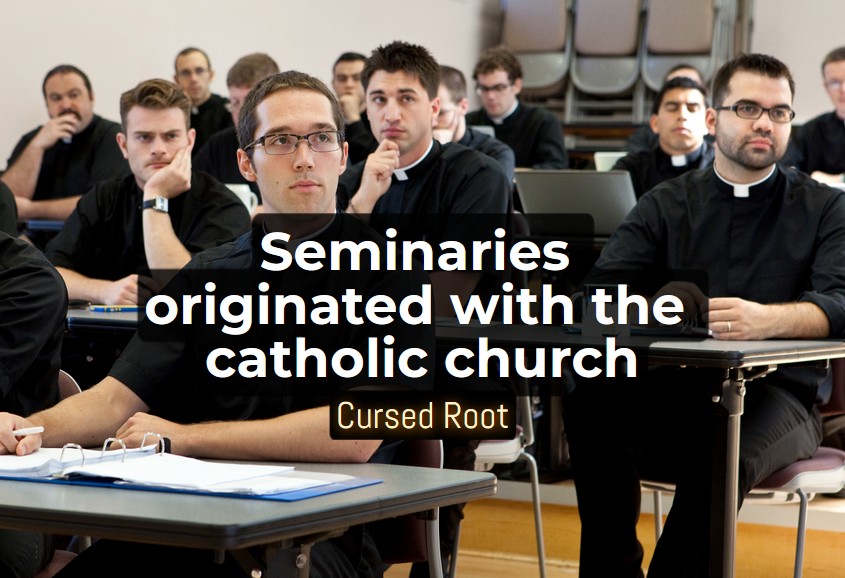
SATAN’S SEMINARIANS [podcast]
Satanic Seminarian System
People have to be first indoctrinated in order to go forth and indoctrinate others, their prey. This is the purpose of seminarians.
What could possibly sound more innocent than a man wanting to serve God going to seminary, right?
BEWARE OF THE SEMINARIANS WHO ARE THE SCRIBES AND PHARISEES OF OUR DAY! Satan loves to use that which sounds noble and spiritual and yet is not biblical. There are no seminaries in the New Testament! And it’s not biblical for a good reason. God’s Divine wisdom. To protect His body. Let’s stay with the Word saints!
SOME of the most pitiful deceivers I’ve ever conversed with have had a so-called “higher education.” In reality, there’s no such thing as a “higher education” outside of learning directly from the Most High Himself, out of the never-changing, crowning jewel literary work in His universe, the Holy Bible (2 Timothy 3:16-17).
HAVE you noticed the lightweight seminarians who peddle their half-truth false gospel, OSAS, calvinism, etc and how they market their community to build their church busine$$?
We should note that in general Christ warned us to “beware of men.” (Matthew 10:17) Jesus told us to beware of specific classes of sinful men. In doing so perhaps to some degree the Son of God was stereotyping. Here Jesus warns us to beware of the religious leaders (seminarians) and civil rulers and perhaps because they could do the most damage: “And he charged them, saying, Take heed, beware of the leaven of the Pharisees, and of the leaven of Herod.” (Mark 8:15)
The moment Jesus saved us, He inducted us into the school of the Holy Ghost and Word of God! THAT’S how God prepares His people for ministry! Seminary is a cheap substitute, waste of time and money (Psalms 119:105; Acts 1:8; 2 Timothy 2:15, etc.). Christ sends men to the cross and Pentecost (Holy Spirit baptism) and never to the seminaries of mere sinful men.
Who needs a seminary to learn God’s Word? – only a lazy man who refuses to lay down his life in this fleeting world and study to learn God’s Word intimately. Such a man is “not valiant for the truth” and so will be turned over to “strong delusion.” (Jeremiah 9:3; 2 Thessalonians 2:9-12)
“We have also a more sure word of prophecy; whereunto ye do well that ye take heed, as unto a light that shineth in a dark place, until the day dawn, and the day star arise in your hearts: 20 Knowing this first, that no prophecy of the scripture is of any private interpretation. 21 For the prophecy came not in old time by the will of man: but holy men of God spake as they were moved by the Holy Ghost.” 2 Peter 1:19-21
Personally, I waste no time on early church fathers or church history. They weren’t ordained, sanctioned by God exclusively to pen the words of Holy Writ, the Bible, which is God’s Word and the highest divine authority (2 Peter 1:19-21; 2 Timothy 2:15; 3:16-17). What’s it matter if you know what they said? The LORD didn’t ordain them to communicate His truth to the world. This does nothing but create confusion (1 Corinthians 14:33). Many would rather listen to what mere men had to say about God and the Bible than to search, study, and learn for themselves what God said in His own Word. The LORD has always instructed His people to study and learn and attend to HIS words (Deuteronomy 4, 6, 11, Isaiah 34:16, etc.).
“Study to shew thyself approved unto God, a workman that needeth not to be ashamed, rightly dividing the word of truth.” 2 Timothy 2:15
Seminarian Repentance
Attention seminarian or Bible College student, graduate: Not only does seminary not prepare you to be used of God, it gives you many things to unlearn and costs you much more than just a lot of wasted money. The ONE who saved you (if you are in fact saved) is the only ONE who can sanctify and prepare you to serve HIM. Seminary is at its root, apostasy, a departing from God to mere sinful men. If you claim to be born again and yet run to men to prepare you, there should be great concern (Galatians 1:16-17). PLAIN PROOF: Today’s apostate modern so-called “churches” become as they are – ichabod – by way of the jesuit-trained seminarian hirelings who drove them headlong into that apostasy. Seminiarian Apostasy Busted and Exposed!
ONLY JESUS can call, prepare and ordain a man to His work! All other “ordinations” and certifications are a fraud! John 15:16 !!!
There were no seminarians in the New Testament except those of the hell bound pharisees.
GOD is unchanging. Jesus sent no one to seminary. Jesus sends men to the cross then Pentecost! Otherwise a man is not fit for ministry. Seminary does not qualify a man for ministry. No, in fact, seminary puts a man light years behind, having many things he must now denounce and overcome and rid his life of. Repent and denounce all your “higher learning.” Until then, you are on your own, full of foolish pride and rebellion and the LORD will not use you (James 4:6-10). Paul denounced his “higher learning” trophies to know, be known of, and used by the LORD! (Philippians 3).
“Despite God’s word commanding men not to boast in their wisdom, and despite being told that “not many wise according to the flesh” are called, today’s evangelical landscape is replete with scribes and pharisees whose default question is, ‘By what authority do you do these things?’ They put their stock in how many credit hours they have obtained at such and such a seminary. Seminary credentials never qualified a man for God’s service, nor does a lack of “formal training” nullify what God approves. Indeed, God has chosen the foolish things of this world to confound the wise (1 Corinthians 1:27) When God calls anyone to a particular task, it matters not if others approve.” Servus Christi
DOES this not sum up what ministry is? Read closely: “For Ezra had prepared his heart to seek the law of the LORD, and to do it, and to teach in Israel statutes and judgments.” (Ezra 7:10)
We must go back further than the “reformation.” Nothing needed to be RE-formed…. because we have a Bible which is the final divine authority (Mark 13:31; 2 Timothy 3:15-17; 2 Peter 1:19-21, etc.). Many of the “reformers” were absolute heretics such as the demon possessed murderous maniac, John Calvin.
YOU see, in seminaries, their premise for teaching church history and about the reformers/reformation is so that their students will be able to discuss such when the topic comes up. But wait, you see THEY, the false priesthood of seminarians are the very ones who created that premise! Called out men must know God’s Word, not church history! SATAN is at work misdirecting men from simply learning God’s Word and walking in the power of the Holy Spirit. So, he’s diverted seminarians from simply learning Scripture using a curriculum that includes pagan prayer practices (contemplative prayer/spiritual formation), church history, and marketing. Jesus never did nor ever will send anyone to a seminary! The Son of God sends men who are truly in His will to the cross and to Pentecost!
Jim Borge writes: “As a young man, I was taught to believe that the Reformation was a great thing. As an older man I have grown to believe that the Church never needed reformation, it needed regeneration.”
IF you went to seminary or Bible college, perhaps the LORD would today lead you to repent of this work of the flesh, denounce it, and announce you utter dependence upon Him! Paul denounced all of his higher education to know and serve Christ (Philippians 3).
Sadly, most seminarians learn the lies of the protestant reformers instead of learning God’s pure Word!
The idea of “reformation” is just another lie and deception. Caution: Paul Washer is a calvinist … we don’t need “reformation” … never did! We need to simply get back to the “old paths” which is the Holy Scriptures! (Jeremiah 6:16) The LORD has given us “ALL things” in His Word! (2 Peter 1:3-4) The insidious, lying idea of a “reformation” is that something needs to be re-formed or formed again! But this is another lie from Satan because God’s Word has been perfect from the beginning and has “all” that we need! Beware. The “Protestant Reformation” was full of devils who believed and taught “reformed theology” and the diabolical system of “calvinism.” Run!
Bottom line: EVERYTHING we need God gave us in His Word and it doesn’t seminary to study and learn God’s Word!
Satan’s seminarians are his invention to put the church on ice!
Thinking of going to seminary? Before you do, read this post.
“What one generation tolerates, the next generation will embrace.” John Wesley
YOU show me a church “pastored” by one of Satan’s seminarians and I will show you a cold, dead, apostate sham!
Today the embrace, connection, and fornication between seminaries and the churches is an embracing of that which was tolerated in generations past and has brought epidemic apostasy in the local churches. The Methodist church is a prime example.
John Wesley was the founder of the Methodist church which is now a dead denomination and has been for a long time. Yet, Wesley was a firebrand for Christ who traveled over 150,000 miles by horseback to spread the Gospel of Jesus Christ. He preached over 40,000 messages from God’s Word in his lifetime!
It was only when the Methodist church began requiring it’s preachers to have a seminary degree that the fire of God extinguished (Ichabod) and the Holy Spirit was quenched. Today the Methodist church is dead men’s bones due to trusting in the flesh, degrees, etc., and not desiring and depending on the divine power of the Word and Holy Spirit.
SATAN HAD A PLAN TO ICE THE FIRE OF THE HOLY SPIRIT IN THE CHURCHES AND IT WORKED – AS FAR AS THE VISIBLE BUILDING-BASED CHURCHES GO.
Simple Scheme: If Satan can ice the seminarians, he ices the people they speak to.
The seminary church system has never nor ever will work to fulfill God’s stated will for His New Testament church. It’s a satanic fraud and counterfeit that has replaced the stated will of the LORD! “Antichrist” means simply “in place of.”
The Pharisees
The hell bound hypocritical pharisees were the seminarians of Christ’s day (Matthew 23).
EVERY catholic priest is seminary trained. What does that tell you?
Calvinistic wolves posing as pastors are seminarian graduates.
What does that tell you? Jude 3-4
Today they control nearly all building based churches.
But wait, don’t men who servant lead need to know the Word? Yes, but that in no way necessitates a “higher learning” center where mere men are in control and inevitably will contaminate.
MESSAGE RECEIVED:
“It does take a little training to rightly divide the Word. Of Truth.”
REPLY:
Yes it sure does …. no seminarian needed which without fail indoctrinates it’s students with extra-biblical heresies no different than the training received by the pharisees/false leaders/seminarians of Christ’s day (Mark 7:6-9).
ORGANIC, HOME BIBLE FELLOWSHIPS IS THE WAY THE EARLY CHURCH BEGAN AND SHOULD BE FUNCTIONING TODAY (ACTS 2:42-47).
Beware of the Seminary Salesmen!
Interestingly, when one searches the internet concerning the case for or against seminary training, he may just find this to be the only piece written from a biblical perspective and against seminary training. In perusing some of the many pro-seminary articles, one will search in vain to find much, if any Scripture. These pro-seminary sales pieces were apparently written by seminarians – using little or no Scripture. One thing is for certain: Jesus and His apostles never once instructed anyone to go to a higher learning facility.
TRULY REPENTING, surrendering your whole being, reputation, and will to Christ, getting baptized with the Holy Ghost, and organically studying God’s Word is the divine equipment for ministry, not seminary!
GOD NEVER CALLED ANYONE TO GET A SEMINARY DEGREE. IF SO JESUS WOULD HAVE TOLD HIS 12 TO GO TO A “HIGHER LEARNING” INSTITUTION. NO, JESUS CALLED HIS 12 AND IS CALLING US TO DIE – TO DENY SELF, TAKE UP THE CROSS, AND FOLLOW HIM! LET’S REPENT SAINTS, THAT’S WHERE IT ALL STARTS, BEGINNING WITH A DIVINE REFRESHING IN OUR SPIRITS! (ACTS 3:19)
Paul had more “higher learning” than 10 seminarians combined and he denounced it all as “dung” (crap) to know and to learn and to teach Christ! Study Philippians 3 afresh.
Jesus led Paul to denounce all of his higher learning – read Philippians 3 afresh with this in mind … he counted it dung … when I did this – denounced my formal education – the LORD delivered me and there was an increased anointing …. only Jesus can ordain us and anoint us to do HIS work – “Ye have not chosen me, but I have chosen you, and ordained you, that ye should go and bring forth fruit, and that your fruit should remain: that whatsoever ye shall ask of the Father in my name, he may give it you.” John 15:16
THE FRUIT OF THE MODERN CHURCHES IS CLEAR PROOF THAT SATAN IS AT THE ROOT OF THE SEMINARIANS WHO’VE DRIVEN THEM INTO APOSTASY!
Biblical Christian training does not involve organizations or institutions of sinful men – whose fruit reflects that of the sham false leaders of Christ’s day – who “love the praise of men more than the praise of God” (John 12:43) and set aside God’s Word to keep their own tradition (Mark 7:6-9). No institution of men needed for deep, thorough, organic, Spirit filled study of God’s Word. Jesus and His apostles never once instructed any person to go to a higher learning institution. In fact the seminarians of Christ’s day mocked the very Son of God specifically for not having a degree or the approval of sinful religious men (John 7:16-18).
“John 7:15 ‘How knoweth this man letters, having never learned?’ The Jews were amazed that Jesus had never formally trained in the Jewish law, had no degree, but had in-depth knowledge of the scriptures. But were did He get this knowledge? From His Father! Same as us!” Karen Cochran
To illustrate how indoctrinated seminarians become and why …. Have you ever noticed that when you see seminary students in coffee shops laboriously studying, you can spot them from a mile away – because they carry 3-10 commentary books of mere men around. That’s their curriculum instead of pure Scripture. Sometimes you can’t even find a Bible in the midst of their many books and when you do, it’s a lame, corrupted new per-version. SMH New Bible Versions and the Satanic Frauds who Invented them Busted and Exposed.
THERE’S A HUGE DIFFERENCE BETWEEN LEADING PEOPLE THROUGH SCRIPTURE AND INDOCTRINATING THEM IN EXTRA-BIBLICAL THEOLOGY SUCH AS THE DIABOLICAL SYSTEM OF CALVINISM/REFORMED THEOLOGY WHICH IS INTENTIONALLY DONE AT SEMINARIES.
One brother illustrates seminaries this way:
“Many colleges are just glorified roach motels…those who go in are infected and go back to infect the entire colony.” Nathan Noyes
JESUS told a seminarian of His day that he had to be “born again.” (John 3:3, 7) Obviously this man was not right with God. Nicodemus was a Pharisee and a member of the Sanhedrin mentioned in three places in the Gospel of John: He first visits Jesus one night to discuss Jesus’ teachings (John 3:1–21). Obviously Nicodemus was not a member of Christ’s family yet. This is clear, landmark proof that being religious and/or a leader in a religion or movement assures not that a person is truly a child of God. Hell is full of religious leaders, most of which are “false” according to Jesus (Matthew 7:15; 24:1,24; 1 John 4:1, etc.). The LORD never designed for His people to go to a school of “higher learning” but rather to receive the only Higher learning available – directly from the MOST HIGH Himself! Remember how the LORD told Ezekiel to simply eat His Word and then go speak those words? (Ezekiel 3)
The rebel at heart will do anything and everything except truly repent. He will mask his rebellion by spending several years and a small fortune to obtain a seminary degree, but like the hell bound false leaders of Jesus’ day, he will not repent.
“He answered and said unto them, Well hath Esaias prophesied of you hypocrites, as it is written, This people honoureth me with their lips, but their heart is far from me.” Mark 7:6
The profile of the seminarian is that he seeks the approval of sinful men and not God.
“And he said unto them, Ye are they which justify yourselves before men; but God knoweth your hearts: for that which is highly esteemed among men is abomination in the sight of God.” Luke 16:15
Sinful men always wants to insert themselves, legitimize and attempt to make prestigious their own personal certification and institutions where they reign and complicate the simplicity of divine truth and its instruction. Beware.
“Trust in the LORD with all thine heart; and lean not unto thine own understanding. 6 In all thy ways acknowledge him, and he shall direct thy paths. 7 Be not wise in thine own eyes: fear the LORD, and depart from evil.” Proverbs 3:5-7
Seminary will never make up for your refusal to authentically repent and get a real life with Christ! John 15:16
Personally, upon having attended 2 Bible colleges, I realized that many of the student, even those in their 4th year, were admittedly not born again. The fruit was obviousl
THERE was no such thing as a priesthood of professional clergy in Christ’s day or in the days of early church! (as far as HIS true kingdom is concerned) In fact, it wasn’t until the antichrist roman catholic cult formed that such a priesthood was instituted and has brought untold destruction since! In short, they’ve replaced the pure worship of Christ with everything under the sun! Jesus saw this coming and prophetically warned us about this when He said “Beware of false prophets, which come to you in sheep’s clothing, but inwardly they are ravening wolves.” (Matthew 7:15) Oh and “And many false prophets shall rise, and shall deceive many.”(Matthew 24:11) ….. Do you understand the import of Ezekiel 22:25-27? Here it is:
“There is a conspiracy of her prophets (false leaders) in the midst thereof, like a roaring lion ravening the prey; they have devoured souls; they have taken the treasure and precious things; they have made her many widows in the midst thereof. 26 Her priests (leaders) have violated my law (Word), and have profaned mine holy things: they have put no difference between the holy and profane, neither have they shewed difference between the unclean and the clean, and have hid their eyes from my sabbaths, and I am profaned among them. 27 Her princes in the midst thereof are like wolves ravening the prey, to shed blood, and to destroy souls, to get dishonest gain.” Ezekiel 22:25-27
The seminary system we see since the early New Testament centuries into the now is a clear manifestation and fulfillment of this prophecy given us by the LORD’s prophet Ezekiel. Exactly as Ezekiel warned, today there is a “conspiracy” among the fraternal order of seminarians who have a stronghold on the denominational franchises they run. Also as the prophet revealed “Her priests (leaders) have violated my law (Word).” (v26) The false prophet seminarians are man-fearing, man-pleasing hirelings who refuse to acknowledge, study, and preach the whole counsel of God’s Word (2 Timothy 4:1-4). Like the phony false priesthood of Christ’s day, they set aside the Word of God in order to keep the tradition and heresies they learned in seminary (Mark 7:6-9). In fact, this is a central biblical definition of false leaders and what they do – and we “know (discern) them by their fruit.” (Matthew 7:16, 20)
“He answered and said unto them, Well hath Esaias prophesied of you hypocrites, as it is written, This people honoureth me with their lips, but their heart is far from me. 7 Howbeit in vain do they worship me, teaching for doctrines the commandments of men. 8 For laying aside (rejecting) the commandment (Word) of God, ye hold the tradition of men, as the washing of pots and cups: and many other such like things ye do. 9 And he said unto them, Full well ye reject the commandment (Word) of God, that ye may keep your own tradition.” Mark 7:6-9
Satan’s Centralized System
We know from the revelation of Scripture that Satan has a well organized kingdom and uses his human agents and their systems to steal, to kill, and to destroy souls (Ezekiel 22:25-27; John 10:10; Ephesians 6:12).
Seminaries are a centralized organization of mere sinful men. SATAN is the centralizer! Think Babylon/Nimrod (Genesis 11). Think the upcoming centralized antichrist system (Revelation 13-14, 17-18). Yes, it’s God who has ordained that His assemblies of His people be autonomous and not controlled by a “headquarter” committee or centralized organization of modern pharisees who in most cases are indoctrinated into extra-biblical doctrines such as the cult of calvinism. Most pastors today are wolves who can’t even lead souls to Christ and deny the need for the baptism of the Holy Spirit (for starters). Satan always, without fail, perverts the men in control and then doles it out to those downstream (the churches). That’s why he centralizes and we are “not ignorant of his devices.” (2 Corinthians 2:11)
The Bible itself is the learning source for every saint. God’s Word is His centralized truth! (John 17:17; 2 timothy 3:16-17)
It’s real simple:
- Are you genuinely born again?
- Can you read?
- Do you have a King James Bible?
Case closed: You do not need to go to seminary. If you do, like the majority of seminarians, you may never return to the LORD to be used of Him and worse.
In the early church there were no professional clergymen as we see today in the apostate modern church world. This was Satan’s plan to denigrate and cease the power of the Holy Spirit which was poured out from Jesus on Pentecost and resulted in thousands being saved. Read Acts. At the hands of seminarian wolves, the modern church world is full of entertainment, marketing, and gimmicks and is plainly lukewarm and dead (Revelation 3:15-16). New Testament elders are not seen in the 27 book New Testament canon as those today who lord it over that which claims to be Christ’s flock. No, rather, elders in the early church were those who navigate and feed oversee (1 Peter 5:1-6). They were more like those who moderate the assemblies of God’s people in contrast with the seminary-trained, hi-jack artists we see in place today.
Seminaries are Wolf Factories! Beware!
“Many pastors have destroyed my vineyard, they have trodden my portion under foot, they have made my pleasant portion a desolate wilderness.” Jeremiah 12:10
Nancy Paul Cote writes: “Thanks again for your ministry’s articles. They so hit home and relate to my experiences of error. We were just talking about this in my new Berean Church yesterday. Both my husband and I can attest to this. Both of us were on fire for God and studied the word of God with our church ministries. We started out with an un-compromised Bible (KJB). Then, we listened to many say that to further our education with God we must go to a Bible College to get a degree to be more equipped for Ministry. Well, as we attended Bible College for 4 years I did not see our passion for biblical Truth growing—but declining. There were so many different views and different Bible Versions it only made me less prepared and more confused. We began relying on what the teachers said rather than what the Bible said because we were sure they know more because they had a degree, right? No, it was almost like I had to detoxify myself of all of man’s wisdom and get back into my KJB and fellowship with those with like-minded passion. I did just that in 2014. God has been so good to me. ‘Who is a wise man and endued with knowledge among you? let him shew out of a good conversation his works with meekness of wisdom. But if ye have bitter envying and strife in your hearts, glory not, and lie not against the truth. This wisdom descendeth not from above, but is earthly, sensual, devilish. For where envying and strife is, there is confusion and every evil work. But the wisdom that is from above is first pure, then peaceable, gentle, and easy to be entreated, full of mercy and good fruits, without partiality, and without hypocrisy. And the fruit of righteousness is sown in peace of them that make peace’ (James 3:13-18).”
False leaders have been the demise and damnation of millions. Hell is full of false leaders and those who chose to follow these wolves in sheep’s clothing instead of Christ.
“For the leaders of this people cause them to err; and they that are led of them are destroyed (in hell).” Isaiah 9:16
Jesus never told you to go to seminary. Rather, He commanded you to lay down your life right now and follow Him. Now read these words from Jesus and see if you need seminary to understand this simple truth:
“If any man will come after me, let him deny himself, and take up his cross daily, and follow me. 24 For whosoever will save his life shall lose it: but whosoever will lose his life for my sake, the same shall save it.” Luke 9:23-24
Professional clergymen have hi-jacked and ruined the life of Christ from that which feigns to be representing Him. Most of them came from Satan’s seminaries!
Seminarian wolves have hi-jacked the local churches and that’s why true followers of Jesus are gathering organically – without the contamination of professional clergy wolves. Individual believers and true ministers of Christ who are not part of their fraternal, Jesuit-trained order are intentionally shunned in the apostate churches and yet are fulfilling their call like Jesus and His apostles – without a building to contain them from reaching the people.
NEWS FLASH: SATAN CONTROLS THE SEMINARIES, CHURCH SYSTEMS, AND LOCAL CHURCHES.
If your thought and perspective of serving God is the vision of a so-called church building, you do not have a kingdom perspective and are in desperate need of repentance, deep Bible study, and praying that the LORD opens your eyes.
When you truly realize that the MOST HIGH, the very KING of kings saves and ordains you – and you truly fear Him and not men – that will be the only ordination you ever mention or acknowledge! (John 15:16) Those to truly know the LORD and obviously fear Him, do not seek the approval of mere sinful men, especially the “accursed” who preach another gospel (Galatians 1:10). | Pastors According to My Heart (Jeremiah 3:15)
THE TRUE DISCIPLE OF JESUS WILL NOT BE SELF-MADE OR SEMINARY-MADE BUT RATHER SAVIOR-MADE! SELAH! SUCH A MAN DILIGENTLY AND DAILY SEEKS THE FACE OF THE LORD IN A LIFE OF PRAYER AND BIBLE STUDY! LIKE THE ONE HE IS TRULY FOLLOWING, HE SEEKS NO APPROVAL OF MEN.
God never sends any man to seminary. They are self-sent. Jesus says to follow Him: He had no degree and was mocked by the hypocritical religious leaders of His day (John 7:15-18). God has not changed. Those who truly know and follow Christ entered into the school of the Holy Ghost and Word of God the day He saved them!!!
ANY LOCAL CHURCH THAT SEARCHES FOR OR WOULD EVEN TAKE AS AN ELDER A SEMINARIAN WHO HAD NOT REPENTED AND DENOUNCED HIS PHONY SEMINARY DEGREE IS AN APOSTATE CHURCH! JOHN 15:16
In the qualifications for an elder among Christ’s body, can you find the need to be degreed?
Biblical Qualifications for Overseers
“This is a true saying, If a man desire the office of a bishop, he desireth a good work.
2 A bishop then must be blameless, the husband of one wife, vigilant, sober, of good behaviour, given to hospitality, apt to teach;
3 Not given to wine, no striker, not greedy of filthy lucre; but patient, not a brawler, not covetous;
4 One that ruleth well his own house, having his children in subjection with all gravity;
5 (For if a man know not how to rule his own house, how shall he take care of the church of God?)
6 Not a novice, lest being lifted up with pride he fall into the condemnation of the devil.
7 Moreover he must have a good report of them which are without; lest he fall into reproach and the snare of the devil.” 1 Timothy 3:1-7
THERE IS NOT ONE MENTION OF A HIGHER LEARNING DEGREE IN THE BIBLICAL LIST OF QUALIFICATIONS FOR AN ELDER. SUCH HAS BEEN ADDED BY MEN AND DEVILS.
The Son of God Didn’t have a Degree!
“And the Jews marvelled, saying, How knoweth this man letters (Jesus had no degree from sinful men), having never learned? (no formal education)
16 Jesus answered them, and said, My doctrine is not mine, but his that sent me.
17 If any man will do his will, he shall know of the doctrine, whether it be of God, or whether I speak of myself.
18 He that speaketh of himself seeketh his own glory: but he that seeketh his glory that sent him, the same is true, and no unrighteousness is in him.” John 7:15-18
On this passage, William MacDonald, author of the Believer’s Bible Commentary, notes:
“7:15 Those who heard the Savior marveled. Doubtless it was His knowledge of the OT (Scriptures) that impressed them most. But also the breadth of His learning and His ability to teach attracted their attention. They knew that Jesus had never been to any of the great religious schools of that day, and they could not understand how He could have such an education as He did. The world still expresses amazement and often complains when it finds believers with no formal religious training who are able to preach and teach the Word of God.
7:16 Once again it is beautiful to see how the Lord refused to take any credit for Himself, but simply tried to glorified His Father. Jesus answered simply that His teaching was not His own, but that it came from the One who sent Him. Whatever the Lord Jesus spoke and whatever He taught were the things which were the things His Father told Him to speak and to teach. He did not act independently of the Father.
7:17 If the Jews really wanted to know whether His message was true or not, it would be easy for them to find out. If anyone really wills to do God’s will, then God will reveal to him whether the teachings of Christ are divine or whether the Lord was simply teaching what He Himself wanted to teach. There is a wonderful promise here for everyone earnestly seeking the truth. If a person is sincere, and truly wants to know what is the truth, God will reveal it to him. “Obedience is the organ of spiritual knowledge.’”
7:18 Anyone who speaks from himself, that is, according to his own will, seeks his own glory. But it was not so with the Lord Jesus. He sought the glory of the Father who sent Him. Because His motives were absolutely pure, His message was absolutely true. No unrighteousness was in Him.
Jesus was the only One of whom such words could be spoken. Every other teacher has had some selfishness mixed in his service. It should be the ambition of every servant of the Lord to glorify God rather than self.”
Cross-Less Curriculums of Seminaries
“Enemies of the cross of Christ.” Philippians 3:18-19
CHRIST’S KING-DOM IS ALLLL ABOUT KING JESUS!!! AND NOT SOME CHUMP WHO’S BUILDING A CHURCH BUSINESS BY ENTERTAINING SELF-SEEKING GOATS WITH MUSIC AND TONED DOWN CLICHE’S, CATCHY PHRASES AND NEUTERED, “SUCCESS” MESSAGES.
“I once heard a wise old pastor say, ‘The best way to strip a man of his Christianity is to send him to Seminary.’” Gina Martin
“I have learned more from born again evangelists who never went to seminary, than those who did. They preach from the heart, keep the message plain and easy to understand, and know their Bible inside out!! More sacrilege and blasphemy has come from seminaries than I can count here. The Holy Spirit will God us in all we do, if we let Him.” Donna Hawthorne Riegler
Jeff Scholz writes: “God’s anointing is in His word. Even someone who is newly born again that barely reads the Bible, when they pick it up, even for the first time, as soon as they start reading God is already speaking to that individual. The LORD can call and use anybody at any time, any one of His people.”
Saints, the seminaries and their seminarian agents have created a stronghold over many parts of that which claims to be Christendom, smothering and snuffing out the life of Christ. Beware. Pray for understanding and insight and spread the light of truth on this darkness that has blanketed the minds of so many. These are the Nicolaitan devils, the very agents of Satan himself and their false systems and doctrines Jesus says He hates (Revelation 2:6, 15). Nicolaitan Devils Busted and Exposed!
Satan uses seminaries and seminarians in pulpits to produce these false leaders and to intercept and distort that innocence of the new believer who is a new creature in Christ by way of being now born again (2 Corinthians 5:17-18).
In the vast majority of local churches today, little emphasis is placed on the divine priorities of essential biblical truth such as the divinity and holiness of the LORD, the necessity of the daily cross and prayer, etc.
SEMINARIANS ARE TAUGHT TO READ WHAT OTHER MEN SAY ABOUT THE BIBLE INSTEAD OF SIMPLY STUDYING THE BIBLE FOR THEMSELVES. THEY ARE COMMENTARY INTENSIVE INSTEAD OF SCRIPTURE INTENSIVE!
I’ve been to two Bible colleges and many of those who attended (the students) were not even born again! Many of them openly and laughingly admitted to such!
Having a seminary degree means that someone has been taught well to not personally study and assimilate the whole counsel of God’s Word in an honest manner but rather to manipulate Scripture to teach and defile others which such diabolical systems of theology as calvinism and un-conditional eternal security. Calvinism is the Devil’s System and all who teach it are his wolves! Beware.
True servants of the LORD must be called and prepared by the LORD, not mere men who falsely feign to be Christ’s representatives. | Divine Preparation for Ministry
“Taught of God” …. (1 Thessalonians 4:9)
“The Holy Ghost teacheth”! 1 Corinthians 2:13
Seminary prepares no one for ministry – Only Jesus can do that in the life of the called-out, obedient men who choose to do things HIS way and not man’s way! “for many be called, but few chosen.” (Matthew 20:16)
SAVE YOUR MONEY AND TIME – GO TO THE SAVIOR, NOT SEMINARY!
If Jesus created, found, saved, and called you, can He not prepare you? (John 15:16)
Where is your faith? Is it in men or God? (Hebrews 11:6)
Some would argue that the world is more civilized now than it was 2,000 years ago when Christ came. Nonsense. They therefore argue that seminaries are a product of our enlightened age. Nonsense.
In the first century, we know of certainty that there was much emphasis placed upon the prestigious institutions of higher religious learning. This is further established by the mocking mention of Jesus not having a degree in John 7:15, and Paul’s credentials – being taught at “the feet of Gamaliel” and “an Hebrew of the Hebrews; as touching the law, a Pharisee.” (Acts 22:3; Philippians 3:5) Obviously there were great centers for religious learning, namely Jewish, in the days of our LORD and His apostles. Yet not only do we have not a single instance of Jesus or His apostles sending anyone to a higher learning center, the graduates of those institutions were actually the greatest persecutors of Christ and His apostles. They were antichrists. Nothing has changed! We have the same scenario transpiring all around us today in the professing church world.
There is no hate here toward men but rather the devil who has deceived men, leading them away from God while claiming to be representing Christ …. this subversion is characteristic of “the spirit of antichrist.”
The very reason we don’t have more intense and diligent Bible learning in the church world is due to seminarian leadership. Meditate on this. Seminary is like the catholic cult – designed by the enemy to keep people out of God’s Word for themselves.
The way “the spirit of antichrist” works…. is while feigning to be representing Christ, it misrepresents Christ. Subversive, insidious deception perpetrated against Christ and His people (2 Thessalonians 2:1-12; 1 John 4:3).
ANYONE WHO CRASSLY DISMISSES THE FACT THAT JESUS NEVER SENT ANYONE TO SEMINARY IS ALREADY OPERATING ON HUMAN WISDOM AND NOT GOD’S WISDOM AND IS DESTINED FOR A WASTED LIFE OF WOLFERY!
Seminaries train men to please men, not God. They train men to operate in devil-inspired and man-controlled churches which are apostate, Ichabod!
The Almighty is not impressed with a seminary degree and in fact cannot use you until you repent and denounce it and announce your full and complete dependence upon Him!
Seminaries create a type of brotherhood or fraternal order which causes the sin of respect of persons (Romans 2:11). In this God-less connection, there is respecter of persons which is a clear and sinful violation of God’s Word (James 2:9).
When some Jews got saved, Jesus told them to continue in the Word and as they did they would know His truth and be made free. Christ had all the opportunity in His Universe to direct these new believers to go to some higher learning institution that had set itself up. No such mention from the Son of God! Here it is:
“Then said Jesus to those Jews which believed on him, If ye continue in my word, then are ye my disciples indeed; 32 And ye shall know the truth, and the truth shall make you free.” John 8:31-32
Heaven’s King here taught these new believers that His truth – knowing and obeying it – would make them His disciples and make them free. Jesus clearly infers here that they could and would definitely know His truth if they “continued in” His “Word.”
To be Holy Ghost filled is very important per Scripture and yet not enough. You must have both the power and revelation of the Holy Spirit and astute adherence to the “sound doctrine” of Holy Scripture (2 Timothy 2:15; 3:15-17, etc.).
NO, YOU DON’T NEED SEMINARY, YOU NEED THE SAVIOR! MORE OF JESUS IS THE ANSWER AND PREREQUISITE FOR MINISTRY.
“Now when they saw the boldness of Peter and John, and perceived that they were unlearned and ignorant men, they marvelled; and they took knowledge of them, that they had been with Jesus.” Acts 4:13
Seminaries are an open pit, drawing men who were never called of God in the first place and intercepting, indoctrinating and destroying men who are actually God-called, making them “twofold more the child of hell than yourselves.” (Matthew 23:15).
Many who sign up for seminary see what they view as an easy profession. All they have to do is get the degree and they can send out resumes. Seminaries are a breeding ground for self glory which is completely contradictory to the teachings of Jesus.
Saints, this pride we see coming from people who claim to be Christian leaders because they attended a seminary is proof of the truth that seminaries do not prepare people to serve God, period. Many are full of self and may God grant repentance. See John 7:18 – “He that speaketh of himself seeketh his own glory: but he that seeketh his glory that sent him, the same is true, and no unrighteousness is in him.”
“Higher learning” is in reality indoctrination, brainwashing.
Is the world getting smarter or dumber? Want to get humbled and embarrassed? Look up the 8th grade primer from just 100 years ago here in America. Most college graduates couldn’t answer near half of those questions. Shocking dumb down! In the same way, preachers of old knew God’s Word and had mountains of Scripture from the King James Bible committed to memory.
EXAMPLE OF THE PROPHESIED GREAT FALLING AWAY / APOSTASY (2 THESSALONIANS 2: NOT 1 SEMINARY TODAY USES THE KING JAMES BIBLE WHICH IS THE PRESERVED WORD OF GOD TO THE ENGLISH SPEAKING PEOPLE OF THE WORLD (PSALMS 12:6-7).
Prayer of Repentance: Father, I here and now acknowledge You and how You alone made, saved, and called me for Your purposes. In the name of Jesus Christ, right this moment, I confess my sin of pride and self-idolatry and for not seeking Your face in this matter. I now see how I went my own way and not Yours. Please forgive me now LORD and instill thy holy fear in my bosom, leading me in Your paths to know and be prepared to be used of You. In Jesus’ name, amen!
Seminaries Slammed!| Today’s False Church System
Pastors | Prepared to be Used | Satan’s Seminaries | Support | STORE | Podcasts | Eternal Security/OSAS | Accounted Worthy to Escape [podcast] | Eternal Security Exposed | Sealed? | The Return of Christ | Lie of the Ages [podcast] | 10 Questions about Eternal Security | Is Salvation Eternal? | The Damning Myth of Unconditional Eternal Security [podcast] | The Essential of Fearing God | The KING is Coming [podcast]


Abiding
The Curse of a Divided Heart and Blessing of a Whole Heart! [podcast]

Israel’s heart was divided. The solution.
“Their heart is divided; now shall they be found faulty: he shall break down their altars, he shall spoil their images … 12 Sow to yourselves in righteousness, reap in mercy; break up your fallow ground: for it is time to seek the LORD, till he come and rain righteousness upon you.” Hosea 10:2, 12
King Asa: Tragic end of an otherwise obedient, fruitful, God-glorifying life….
Are you blessed or cursed?
“Thus saith the LORD; Cursed be the man that trusteth in man, and maketh flesh his arm, and whose heart departeth from the LORD.” Jeremiah 17:5
King Asa trusted the physicians and not the LORD and he paid dearly.
“And Asa in the thirty and ninth year of his reign was diseased in his feet, until his disease was exceeding great: yet in his disease he sought not to the LORD, but to the physicians.” 2 Chronicles 16:12
Feet speak of foundation. Without feet, physically we cannot stand. Without a sound foundation of truth, of God’s Word in our lives, we shall not stand. Read Matthew 7:19-29.
One writes notes the following about the meaning of feet in God’s Word:
“Why Are Feet Important in the Bible? Just as men and women stand upon their feet as the foundation of upright posture, Bible verses also use feet as a euphemism to represent a strong foundation in various circumstances. Feet are not referenced as we see them today, but they are used as symbols to represent greater metaphorical concepts, such as guidance or direction.
The feet represented something that was common to all people but used differently. For example, one of the most noted scripture texts involving feet is Psalm 119:105, ‘Thy word is a lamp unto my feet, and a light unto my path.’ This emphasizes how the feet are used to travel and traverse. Yet, without the word, the traveler is left walking in the dark without a known path.
Essentially, the feet are referenced as a critical part of life as walking was commonplace. We naturally travel where our feet lead us and the Bible verses use feet to represent a means of traveling through life itself. If we walk down a dark path, we are likely to stumble. If we walk down a holy path, we are sure to please God. All of this is facilitated symbolically by the feet.”
The foundation truth we learn in God’s Word and obedience to it determines the direction of our lives.
“As ye have therefore received Christ Jesus the Lord, so walk ye in him: 7 Rooted and built up in him, and stablished in the faith, as ye have been taught, abounding therein with thanksgiving.” Colossians 2:6-7
Becoming Rooted and Grounded in Christ
Like Asa, many today trust the counsel of mere men, such as doctors and not God. This doesn’t mean going to a doctor is a sin and yet, the true disciple will primarily trust and obey and be led of the LORD, not men.
“But without faith it is impossible to please him: for he that cometh to God must believe that he is, and that he is a rewarder of them that diligently seek him.” Hebrews 11:6
Read Hebrews 3-4 prayerfully for the eternal danger of having “an evil heart of unbelief” AFTER being saved. Repentance required.
“They speak vanity every one with his neighbour: with flattering lips and with a double heart do they speak.” Psalms 12:2
Got depression? Are you seeking the LORD in true repentance whereby He will grant you great joy? (Psalms 51; 2 Timothy 1:7) Or, are you seeking out and trusting the mere human, the finite pundits of this fleeting world?
“But ye are forgers of lies, ye are all physicians of no value.” Job 13:4
Those who trust human physicians and not the Great Physician, are cursed, not blessed. Their faith in mere men reveals their utter rebellion.
“See, I have this day set thee over the nations and over the kingdoms, to root out, and to pull down, and to destroy, and to throw down, to build, and to plant.” Jeremiah 1:10
2 Chronicles 15:17 – Upon becoming king in Judah, Asa, having inherited an idolatrous, lukewarm people, system… he began to command that…
- The people do that which is right in God’s eyes (2 Chronicles 14:2)
- That all idolatrous altars we torn down (2 Chronicles 14:3)
- That God’s people seek His face (2 Chronicles 14:4)
- That idol altars in the cities of Judah be removed – “and the kingdom was quiet before him” (2 Chronicles 14:5) ….. Proverbs 1:33
- Fenced cities be built …. so the land could be at rest, at peace, and not fear the enemy (2 Chronicles 14:6)
- The people be involved in building fenced, walled, protected cities – “Therefore he said unto Judah, Let us build these cities, and make about them walls, and towers, gates, and bars, while the land is yet before us; because we have sought the LORD our God, we have sought him, and he hath given us rest on every side. So they built and prospered.” (2 Chronicles 14:7) …… 1 Chron 16:11
- Great military be built (2 Chronicles 14:8)
“The LORD is with you, while ye be with him; and IFFFF ye seek him, he will be found of you; but IF ye forsake him, he will forsake you.” 2 Chronicles 15:2
“But the high places were not taken away out of Israel: nevertheless the heart of Asa was perfect all his days.” 2 Chronicles 15:17
“Well; because of unbelief they were broken off, and thou standest by faith. Be not highminded, but fear: 21 For if God spared not the natural branches, take heed lest he also spare not thee. 22 Behold therefore the goodness and severity of God: on them which fell, severity; but toward thee, goodness, if thou continue in his goodness: otherwise thou also shalt be cut off.” Hebrews 11:20-22
“The wicked shall be turned into hell, and all the nations that forget God.” Psalms 9:17
“Now consider this, ye that forget God, lest I tear you in pieces, and there be none to deliver.” Psalms 50:22
“Believe in the LORD your God, so shall ye be established; believe his prophets, so shall ye prosper.” 2 Chronicles 20:20
God blesses those who trust Him and curses, removes His blessings from those who once trusted Him and yet now have forgotten Him. When we willingly offer ourselves as living sacrifices to the LORD our God, He avenges us of all our enemies (Judges 5:2) …. “But IF thou shalt indeed obey his voice, and do all that I speak; then I will be an enemy unto thine enemies, and an adversary unto thine adversaries.” (Exodus 23:22)
“WHEN” does God avenge us of our enemies? “WHEN” does God judge our enemies?
“Praise ye the LORD for the avenging of Israel, WHEN the people willingly offered themselves.” Judges 5:2
When we offer our lives a living sacrifice unto the LORD – that is, we simply surrender this life to Him – the subduing of our enemies begins.
“I beseech you therefore, brethren, by the mercies of God, that ye present your bodies a living sacrifice, holy, acceptable unto God, which is your reasonable service. 2 And be not conformed to this world: but be ye transformed by the renewing of your mind, that ye may prove what is that good, and acceptable, and perfect, will of God.” Romans 12:1-2
Asa reigned as king in Judah for 39 years (2 Chronicles 14-16).
In his final days, after obeying God and bringing much needed reform to the people of God, Asa forgot the LORD, and had grown cold in his faith and was therefore cursed with a divided heart.
All those who trust mere men, just because they have a white coat on and are called “doctor”, are going to die as did king Asa who trusted in earthly physicians, instead of the Great Physician! Repent now sinner.
“Trust in the LORD with all thine heart; and lean not unto thine own understanding. 6 In all thy ways acknowledge him, and he shall direct thy paths. 7 Be not wise in thine own eyes: fear the LORD, and depart from evil.” Proverbs 3:5-7
Are you a pessimistic pansy or an optimistic overcomer? Are you like the 10 spies or the 2 who entered the promised land while the 10 sad sack whiners were shut out? “The righteous are bold as a lion.” (Proverbs 28:1) Jesus asks “WHERE is your faith?” (Luke 8:25) Repenting for real and putting all your trust in the LORD is essential – and no one will be in the promise land of Heaven without sound, solid faith in God. “Without faith it is impossible to please him.” (Hebrews 11:6). “Thus saith the LORD; Cursed be the man that trusteth in man, and maketh flesh his arm, and whose heart departeth from the LORD.” (Jeremiah 17:5)
Read Revelation 2-3.
Remember the woman Jesus, the Great Divine Physician made whole of her issue who had previously spent all she had on human physicians?
“And a certain woman, which had an issue of blood twelve years, 26 And had suffered many things of many physicians, and had spent all that she had, and was nothing bettered, but rather grew worse, 27 When she had heard of Jesus, came in the press behind, and touched his garment. 28 For she said, If I may touch but his clothes, I shall be whole. 29 And straightway the fountain of her blood was dried up; and she felt in her body that she was healed of that plague. 30 And Jesus, immediately knowing in himself that virtue had gone out of him (accessed by faith in Him), turned him about in the press, and said, Who touched my clothes? 31 And his disciples said unto him, Thou seest the multitude thronging thee, and sayest thou, Who touched me? 32 And he looked round about to see her that had done this thing. 33 But the woman fearing and trembling, knowing what was done in her, came and fell down before him, and told him all the truth. 34 And he said unto her, Daughter, thy faith (in God not men) hath made thee whole; go in peace, and be whole of thy plague.” Mark 5:25-34
You claim to be trusting God but you take a mood drug? I don’t think so. MOOD DRUGS ARE FOR THE WICKED UNBELIEVERS. PERIOD. REPENT.
When a person resorts to using a drug to uplift their mood, they are loving and believing the world more than God, forfeiting the blessing of God for a cheap substitute, and manifesting their contempt for the LORD, their unbelief. A born again, presently abiding  disciple of Jesus has all the fruit of the Holy Spirit which include, “Love, joy, peace…” (Galatians 5:22-23) God gives His people “power… love, and a sound mind.” (2 Timothy 1:7) God’s Word has the answer to “ALL things that pertain unto life and godliness” and that specifically includes a “sound mind.” (2 Peter 1:3-4) Holy Scripture specifically uses the terms “sound mind” and “sound heart” which come only from learning and adhering to “sound doctrine.”
disciple of Jesus has all the fruit of the Holy Spirit which include, “Love, joy, peace…” (Galatians 5:22-23) God gives His people “power… love, and a sound mind.” (2 Timothy 1:7) God’s Word has the answer to “ALL things that pertain unto life and godliness” and that specifically includes a “sound mind.” (2 Peter 1:3-4) Holy Scripture specifically uses the terms “sound mind” and “sound heart” which come only from learning and adhering to “sound doctrine.”
We live in a fallen world and were born in sin. Via the things that have happened to us and that we ourselves have perpetrated on others, fragmentation of our hearts has occurred. Only One can make us whole.
“And there was delivered unto him the book of the prophet Esaias. And when he had opened the book, he found the place where it was written, 18 The Spirit of the Lord is upon me, because he hath anointed me to preach the gospel to the poor; he hath sent me to heal the brokenhearted, to preach deliverance to the captives, and recovering of sight to the blind, to set at liberty them that are bruised, 19 To preach the acceptable year of the Lord.” Luke 4:17-19
“And the very God of peace sanctify you wholly; and I pray God your whole spirit and soul and body be preserved blameless unto the coming of our Lord Jesus Christ. 24 Faithful is he that calleth you, who also will do it.” 1 Thessalonians 5:23-24
“He healeth the broken in heart, and bindeth up their wounds.” Psalms 147:3
Counting it all Joy
“My brethren, count it all joy when ye fall into divers temptations; 3 Knowing this, that the trying of your faith worketh patience. 4 But let patience have her perfect work, that ye may be perfect and entire, wanting nothing. 5 If any of you lack wisdom, let him ask of God, that giveth to all men liberally, and upbraideth not; and it shall be given him. 6 But let him ask in faith, nothing wavering. For he that wavereth is like a wave of the sea driven with the wind and tossed. 7 For let not that man think that he shall receive any thing of the Lord. 8 A double minded man is unstable in all his ways.” James 1:2-8
Through the trials we face in this life, we must learn to “count it all joy when ye fall into divers temptations”, trust God not men, ask for and rely on His wisdom and not waver, but rather finished our course trusting and walking with Christ to the end of our lives.
“I have fought a good fight, I have finished my course, I have kept the faith:” 2 Timothy 4:7
“For God is not unrighteous to forget your work and labour of love, which ye have shewed toward his name, in that ye have ministered to the saints, and do minister. 11 And we desire that every one of you do shew the same diligence to the full assurance of hope unto the end: 12 That ye be not slothful, but followers of them who through faith and patience inherit the promises.” Hebrews 6:10-12
The Whole Heart
“And all Judah rejoiced at the oath: for they had sworn with all their heart, and sought him with their whole desire; and he was found of them: and the LORD gave them rest round about.” 2 Chronicles 15:15
The result of seeking the LORD with a whole heart is that He gives us “rest round about.”
“But whoso hearkeneth unto me shall dwell safely, and shall be quiet from fear of evil.” Proverbs 1:33
9 Times in the book of Psalms the words “Whole Heart” appear. Here’s the first 3 of that collection:
“I will praise thee, O LORD, with my WHOLE HEART; I will shew forth all thy marvellous works.” Psalms 9:1
“Praise ye the LORD. I will praise the LORD with my WHOLE HEART, in the assembly of the upright, and in the congregation.” Psalms 111:1
“Blessed are they that keep his testimonies, and that seek him with the WHOLE HEART.” Psalms 119:2
PRAYER: Dear heavenly Father, I have sinned against You by not wholly trusting You. I have not sought You with my whole heart. Here and now I confess this for the evil sin of unbelief and rebellion that it is and ask You to please forgive me now in the name of Jesus. Please wash me afresh from all my sins with the precious blood of Jesus Christ. Also please make my heart whole and increase and fill me with Your faith Father, and cause me to trust You with all of my heart, no matter what. I love You my dear LORD. In Jesus’ name. Amen.
Lukewarm is Hell Bound | OSAS/eternal security is a lie from hell |
Support | STORE | Podcasts | Jail/Prison Ministry | Mexico Mission here | All Ministry Updates | The Return of Christ | Stewardship | Apostate Modern Church Exposed | Beware of the BUZZ WORD Bandits [podcast] | Preach the Word | Wolves Exposed | Church Membership Exposed | 100’s of Christ-centered, Scripture-rich Podcasts | Knowing God | The Cross Life | Christology = the Study of Christ




 America12 months ago
America12 months agoThe Drugging of America: The Pharmakeia Sorcery Deception [podcast]

 Articles2 years ago
Articles2 years agoChildren being Rescued in Tunnels: Happening Now – UPDATE!

 Articles8 years ago
Articles8 years agoSelf-Examination in Preparation for the Lord’s Return

 Apostasy2 years ago
Apostasy2 years agoSHOCKING List of False Prophets Most Believe are True













